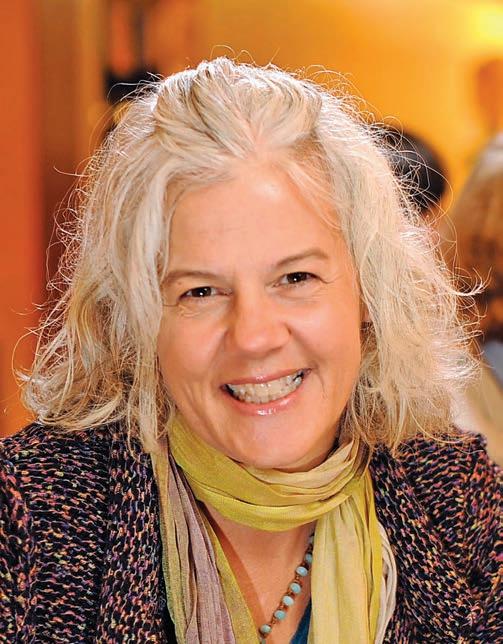














On the Cover:
It’s hard to think of Canton and not immediately picture its famed paper mill. But now over a week after the news was broken that the region’s largest manufacturer will shut down for good, a lot of questions have emerged. As more stakeholders emerge to find solutions, the town’s residents are hoping to prove that once again they can weather another storm. The Pactiv Evergreen paper mill, as seen from a Canton side street. Cory Vaillancourt photo
News
Charges dropped against police shooting victim......................................................6
Former worker reflects on career amid Canton mill closure....................................7 Canton, county will solve huge mill problems ............................................................9 Canton mill’s closing means uncertainty for county, region..................................10 Survey will study impact of mill closure......................................................................13
Papertown stands strong in the face of an identity crisis......................................14

Papertown’ through the eyes of a lifelong resident, historian..............................18 Faith in our beloved Papertown....................................................................................19
A&E
Literary Festival offers national book award winners, bestsellers........................20
Anne Tyler gives us another never-ending song......................................................27
After mill closes, a healthier Pigeon could help Canton recover........................28 Notes From a Plant Nerd: Worts and all....................................................................34
Amanda Bradley.
Sophia Burleigh.
C LASSIFIEDS: Scott Collier. .
N EWS E DITOR: Kyle Perrotti.
WRITING: Holly Kays.
susanna.b@smokymountainnews.com
jc-ads@smokymountainnews.com


classads@smokymountainnews.com
holly@smokymountainnews.com Hannah McLeod.
Vaillancourt.
Garret K. Woodward.
ACCOUNTING & O FFICE MANAGER: Amanda Singletary. . . . . . . . . . . . . . . . . . . . . . . smnbooks@smokymountainnews.com
D ISTRIBUTION: Scott Collier. . . . . . . . . . . . . . . . . . . . . . . . . . . . classads@smokymountainnews.com

C ONTRIBUTING: Jeff Minick (writing), Chris Cox (writing), George Ellison (writing), Don Hendershot (writing), Susanna Shetley (writing)
WAYNESVILLE | 144 Montgomery, Waynesville, NC 28786
P: 828.452.4251 | F: 828.452.3585
SYLVA | 629 West Main Street, Sylva, NC 28779
P: 828.631.4829 | F: 828.631.0789
I NFO & B ILLING | P.O. Box 629, Waynesville, NC 28786
Copyright 2023 by The Smoky Mountain News.™ Advertising copyright 2023 by The Smoky Mountain News.™ All rights reserved. Reproduction in whole or in part without permission is prohibited. The Smoky Mountain News is available for free in Haywood, Jackson, Macon, Swain and parts of Buncombe counties. Limit one copy per person. Additional copies may be purchased for $1, payable at the Smoky Mountain News office in advance. No person may, without prior written permission of The Smoky Mountain News, take more than one copy of each issue.
SUBSCRIPTION: 1 YEAR $65 | 6 MONTHS $40 | 3 MONTHS $25
facebook.com/ChurchStreetDepot











 written by Ingles Dietitian Leah McGrath
written by Ingles Dietitian Leah McGrath



There’s no easy answer to this one because there’s no hard definition of “local”. For some, local may mean:







• a geographic distance, e.g. within a certain amount of miles from their home. (Some consider “local” to be within 100 miles of their home.)
• in their county, state, or region (the Southeast) or even in their country. (Some think “local” food should just be from their state.)

In addition to these location-based definitions some think “eat local” should also apply to the size of a food company, business, or farm and expect that local companies or farms may be small in scale or have few employees.
Across the state, North Carolina has a robust agricultural economy ranging from small-scale farmers who may grow produce or raise animals to sell at or supply road-side stands or tail-gate markets to large-scale farms and producers who grow for supermarkets or supply national restaurant chains.


It takes farmers and food producers of all sizes and from all sorts of locations to feed people.



 BY HOLLY KAYS STAFF WRITER
BY HOLLY KAYS STAFF WRITER
Jason Harley Kloepfer left his home near Murphy on Dec. 13, 2022, with bullets in his body and criminal charges in the courthouse. Now, more than two months after an officer-involved shooting that made international headlines, misdemeanor charges accusing Kloepfer of communicating threats and resisting a public officer have been dropped.
According to a dismissal filed March 1, the charge of communicating threats was dropped “at the request of the prosecuting witness.” On the same day, the charge of resisting a public officer was let go “upon prosecutorial discretion and the charging document does not list the type of orders given and under what circumstances that this would be a duty of their office,” the dismissal states. The charges were dropped at the discretion of District Attorney Ashley Welch, who declined to offer any further comment on the decision.
The dismissal of Kloepfer’s case came about two weeks after his attorney Zeyland McKinney filed six subpoenas Monday, Feb. 13, seeking a plethora of documents, communications and video related to the case. Subpoenas issued for Cherokee Indian Police Department Chief Carla Neadeau and CIPD officers Christopher Harris, Nathan Messer, Neil Ferguson and Andrew Sampson, as well as Cherokee County Sheriff Dustin Smith.
Records sought from both CIPD and Cherokee County included video from body cams, dash cams and the robot that entered Kloepfer’s home, as well as policies for use of deadly force and use of body cams. The subpoenas also called for any psychological evaluations done on CIPD officers prior to Dec. 14, any mission pre-plans or after-reports related to the Dec. 13 response and any documents showing who signed the mutual aid agreement before the raid Dec. 13.
Additionally, Kloepfer’s attorney asked for text messages between Smith and key members of the CIPD and Cherokee County Sheriff’s Department, any texts between Cherokee County deputies and the 911 caller and communications between the county and anyone contacted about providing emergency medical service to Kloepfer after the shooting.
Subpoenaed parties were given until March 9 to either produce the material or appear in court. With the case now dismissed, the subpoenas will no longer be carried out.
The two misdemeanor charges were the least of Kloepfer’s worries as he left his camper trailer on Upper Bear Paw Road in an ambulance Dec. 13, following an incident that would spawn conflicting narratives and urgent questions about why police took the actions they did. Kloepfer has posted photos showing a scar running up the center of his torso from hip level to just below the breastbone, with another scar where a bullet struck his right arm.
“No we are not home,” Kloepfer wrote in a Feb. 13 Facebook post. “We probably will
never live there again after that nightmare.”
Kloepfer was shot by members of the CIPD SWAT Team, which the Cherokee County Sheriff’s Office called in following an 11 p.m. 911 call from Kloepfer’s next door neighbor Dec. 12. The neighbor alleged that Kloepfer had been shooting a gun and yelling that he was going to kill the whole neighborhood, and she implied that he may
agreement between Cherokee County and CIPD in effect at the time. The previous Memorandum of Understanding had died with the term of former Sheriff Derrick Palmer, who left office a week before the incident.
the shooting was based on information provided by the CIPD. Smith’s original statement said the shooting happened after Kloepfer “engaged in a verbal altercation with officers” and confronted them as he emerged from his camper trailer.
have shot his wife or otherwise harmed her. Cherokee County deputies visited the property soon afterward but didn’t see Kloepfer and couldn’t enter the home without a search warrant. The next step was to secure a search warrant and ask for help from the CIPD, which unlike Cherokee County has its
“If they could, contact the sheriff or the highest-ranking person that they got that’s on duty tonight to do that, because we got to make sure that we’re, you know, covered on the assistance thing,” CIPD’s SWAT commander told dispatch before arriving in Murphy. Cherokee County produced the resulting document following a public records request from The Smoky Mountain News. The letter is a “formal request” that Roger Neadeau Jr. of CIPD and the CIPD SWAT team be allowed to assist Cherokee County at 3:11 a.m. Dec. 13, 2022. While on duty, the letter says, these officers are to have the same jurisdiction, power, rights, privileges and immunities as officers of Cherokee County — in addition to those the officers normally possess.
The letter bears two signatures, one from D. Smith, which would be Sheriff Dustin Smith, and another difficult-to-read signature from somebody representing CIPD. The presence of Smith’s signature on the docu-
When Kloepfer posted home security video Jan. 18 that did not show any altercation but did show him standing in the camper door with his hands held high at the moment he was shot, Smith issued a new statement blaming CIPD for the apparently false information contained in the original release. Dispatch logs show multiple county deputies and investigators were on scene at the time of the shooting, in addition to the CIPD team.


SMN’s public records request that yielded a copy of the Dec. 13 agreement between Cherokee County and CIPD had sought other documents as well, including text messages and emails between various members of the Cherokee County Sheriff’s Office and employees of the Eastern Band of Cherokee Indians at the time of the incident and in its aftermath. After one month and multiple follow-ups from SMN, the county released the Dec. 13 agreement along with a letter stating that, “regarding communications involving the other people listed in your request, at this time, we are unable to release those records, in accordance with North Carolina G.S. 132-1.4.”
This statute places restrictions on release of investigation records but requires a court order to prevent release of a record that would normally be public. It also makes clear that “the use of a public record in connection with a criminal investigation or the gathering of criminal intelligence shall not affect its status as a public record.”
“The Public Records Law exemption applies to particular criminal incidents, not to general information,” said Amanda Martin, an attorney with the Stevens Martin Vaughn & Tadych firm that focuses on First Amendment issues. “So if there are emails discussing an issue, as opposed to a particular case, those should be public.”
own SWAT team.
All of this took time to carry out. The search warrant was secured at 2:14 a.m. but not executed until nearly three hours later. This was at least in part due to the 70-mile drive from Cherokee to Kloepfer’s home and to the fact that there was no mutual aid
ment pairs with statements on radio traffic to show that he was at the sheriff’s office that morning.
However, Smith has maintained that neither he nor Deputy Sheriff Justin Jacobs were present at Kloepfer’s home, and that the press release his office published hours after
Though she chose to drop the charges, Welch will have another decision to make stemming from the events of Dec. 13. As is routine when an officer shoots a citizen while on duty, the SBI is investigating the incident and will send the resulting report to Welch. SBI reports never become public, but the document will allow Welch to decide whether to press criminal charges against any of the law enforcement officers involved.
Neadeau declined to comment for this story, citing the ongoing investigation. McKinney, Kloepfer’s attorney, did not return a request for comment.
At 94 years young, Ben Best is proud of several things in his long, bountiful life — a marriage of 67 years and counting, raising three healthy sons, being a grandfather, a loyal friend to many, and a hardscrabble Haywood County farmer.

And, near the top of that list of achievements and dreams fulfilled, he also holds a deep sense of pride for his 37 years as an employee of the Champion Paper & Fibre Company in Canton.
“Those paychecks paid for the home we’re sitting in,” Best said. “We built this house in 1957 and paid off the debt in five years. Those paychecks supported a family, cars in the driveway, and kept the farm going — that meant a lot.”
Sitting in the living-room of his farmhouse in the tightknit mountain community of Crabtree one recent afternoon, Best gazed out onto his 180-acre property in the rural depths of Haywood County. Even in his 90s, the lifelong farmer still works the land each day, climbing up on his John Deere tractor and doing what needs to be done.
“I used to drive a truck just like that,” Best pointed to a toy tractor-trailer on a
nearby bookshelf, the word “Champion” emblazoned across the antique-looking rig.
From 1956 to 1993, Best worked mainly for the trucking department of Champion. He spent the first five years of his career at the Canton paper mill. Then, when they needed paper hauled between the main Canton facility and the “Little Champion” plant in Waynesville, Best shifted into trucker mode.
“So, we started this trucking department through the mill, hauling large rolls of paper from Canton to Waynesville,” Best recalled. “And, for about a quarter of my career, I was on the road hauling paper. I got to see the lower 48 states and Canada. One year, I drove a truck to California and back eight times, and this was before there were interstates — it was just two-lane roads coast-tocoast.”
Nowadays known as Pactiv-Evergreen, the Canton paper mill announced last week that it will be closing this summer after 115 years strong in Haywood County. Over 1,000 workers will lose their jobs, with countless other industries and families also affected by the abrupt decision.
“Having a job at the mill was a sense of pride,” Best said. “It was good money and
you were able to survive.”
Following graduation from Crabtree High School, Best took on some carpentry work for a year, then joined the Army, ultimately serving his country while stationed in Germany. After he was honorably discharged, he returned to Western North Carolina and was a mail carrier for a stint.
But, in 1956, Best’s life was forever changed. He and his brother also ran a service station in Clyde. One day, a good friend of Best’s wandered into the station and asked if he’d like to work for Champion. Best said yes. The friend said he’d see what he could do.
“Working for Champion was something everybody wanted, and not everyone could get,” Best noted. “It was mostly a family affair. If you had family working there, you could get on. If you didn’t, it was almost impossible.”
At age 26, Best started work at the Canton mill for $1.95 an hour.
“It was better than nothing,” Best chuckled when asked about the pay rate. “That was good money in this area. It was better than most people made back then.”
Not long after he started at the mill came the arrival of Best’s first son in early 1957. And as he began to get acquainted with the job and his co-workers, Best found sincere enjoyment in getting to know the “oldtimers” that had been at the mill for years.
“Back during World War II, when all the young men went into the [military], the old men had to go to the mill and work,” Best said. “And, when I went to work there, there
was a lot of those old guys still there.”
Best reminisced about how knowledgeable the old-timers were, how they knew every nook and cranny in the mill, and how prideful each was in how well they held their position. He even remembers when there was also profit-sharing for employees.
But, that all changed when the mill owner, Reuben B. Robertson Jr., was killed in a car accident in Cincinnati, Ohio, in 1960.
“As long as [Reuben] was alive, they had profit-sharing for every paycheck if Champion made a profit,” Best said. “After he was killed, it all went down from there and they stopped the profit-sharing.”
Regardless, Best and thousands of others who were, and remain, employed by the mill over the decades were able to carve out a comfortable existence — a better life for them, their families, and their friends. To note, all three of Best’s sons worked for the mill at some point, with one making it to retirement from the company.
“I enjoyed my job and I’m proud of my time with Champion,” Best said. “And I hate to see the mill shut down. I was just reading [in the newspaper] today, one fellow says, ‘It makes big men cry’ — this is going to hurt a lot of people.”
When asked what it means to hear the mill is closing after all these years, Best paused for a moment, only to look up at the small toy truck on the bookshelf.
“It means everything,” Best said in a humbled tone. “All of those jobs are now gone, and all of the other people that will be affected — it’s sad, it really is.”
‘Working for Champion was something everybody wanted, and not everyone could get. It was mostly a family affair. If you had family working there, you could get on. If you didn’t, it was almost impossible.’— Ben Best From 1956 to 1993, Ben Best worked at for the Champion paper mill in Canton. Now known as Pactiv-Evergreen, the mill announced last week that it will be closing this summer after 115 years. Garret K. Woodward photo
No one living can remember a time when there wasn’t a paper mill at the heart of Canton. Now, after 115 years in operation, it all comes down to three months.
On March 6, Pactiv Evergreen kicked off a week that would rock Western North Carolina by announcing it would shutter the venerable old mill. In three months, the last whistle will blow.
In three months, the age of the Southern Appalachian lumber barons will end.
In three months, the sickly-sweet stench of money in the air will vanish forever.
Already long gone are the company picnics at Lake Logan, the rec league softball teams and the notions that a worker could spend their entire life honing one particular craft knowing that they’d have some semblance of economic security and maybe, just maybe, have the chance to pass along generational wealth to their descendants. The closing of what locals still call “Champion” will be the final blow.
While the announcement shocked workers, their families and the community at large, they’re all just now beginning to contemplate how to address challenges that didn’t exist before March 6, multifaceted and massive as they may be.
What they’re finding is that the best way — the only way really — to eat an elephant, is one bite at a time.

It’s a picturesque little burg bisected by railroad tracks and the river that runs straight through it.
Modest mom-and-pop shops line the cozy main street, not far from early-20th century homes that still stand as a testament to an era of wealth and prosperity. Unemployment remains low, and many if not most collars there are blue.
For more than a century, the town forged a distinct identity of its own, despite serving as a bedroom community to a much larger city just 30 miles to the east.
The facility, once called Champion Paper and then Blue Ridge Paper and now Pactiv Evergreen, provided a meaty living for these small-town folks who’d come to rely on the good-paying jobs as a means of economic and social mobility — the American Dream, basically.

“You’ve had people, their grandfathers worked there, their mothers, their fathers. It was always a family tradition,” said James Graven, mayor of Olmsted Falls, Ohio. “A good friend of mine worked there. He’s a vet and returned from Vietnam and got his job back. It’s been a big part of our community for a long time, about 60 years.”
On March 6, the towns of Olmsted Falls, Ohio and Canton, North Carolina became forever linked when Pactiv Evergreen announced it would halt operations at several major North American facilities.
Graven said he never heard from company officials about the closing of his town’s second-largest employer and instead learned about it on the morning of March 7, after employees began taking to social media the previous night.
“Just as soon as I found out that they were closing, I had a meeting with my finance director and my economic development director,” he said. “Number one, let’s do whatever we can to help all these employees transition into new jobs and number two, let’s market the property, get another industry in there.”
Olmsted Falls has a population of 8,600 residents, nearly double Canton’s 4,400. It sits on the southwestern flank of the Cleveland metropolitan area in a county with 1.3 million people, compared to Canton’s county of Haywood, population 62,500.
While the loss of 160 jobs in Olmsted Falls pales in comparison to the expected 800 manufacturing jobs that have gone up in smoke in Canton, the blow still stings for Graven.
“Not only do I feel bad for the employees in Olmsted Falls, I also feel bad for the people in North Carolina who are losing their jobs,” Graven said. “You know, it’s bad enough when one person loses a job but it’s really terrible when you have approximately 1,300 people losing their jobs.”
Despite the similarities between Olmsted Falls and Canton, there is one big difference.
The decline of American manufacturing has been well-documented through both story and song, but Cleveland’s extant industrial base, ready Great Lakes access and sheer population size may just make it easier for workers in Graven’s rust belt town to melt
into the economic fabric of surrounding communities.
“I’m hoping that they find new employment fairly soon, maybe even better paying jobs,” Graven said.
Workers in Mayor Zeb Smathers’ Canton, however, will face significant challenges in rural Southern Appalachia, where manufacturing concerns on the scale of Canton’s paper mill have grown increasingly rare.
The greater Haywood County community, including public and private sector institutions as well as ordinary individuals, wasted no time in prioritizing workers affected by the impending layoffs.
A Facebook group quickly materialized, sharing information on hiring opportunities in the region. As with Olmsted Falls, the Town of Canton will hold a job fair.
During the town’s regular March 9 board meeting, administrators announced the creation of a website, milltownstrong.com, as a resource for affected workers, but Haywood Community College has taken the lead on establishing a clearinghouse of sorts for other employment resources.
Shelley White, president of HCC since 2019, has significant experience in workforce development and had also been a part of “rapid response” teams in the past.
At a March 10 press conference, White called for a unified community response.
“I’ve seen this firsthand,” White said. “I’ve seen how the sadness and uncertainty will turn the page and will turn towards hope and new opportunity. And I do find hope in the fact that I still see people today in Buncombe County who I had a chance to work with during those years who found new opportunities, found new careers and found stabilization and a new day to move forward.”
White acknowledged that many employ-
ees will start new jobs immediately and that HCC was there to fill in the gaps.
She was joined by representatives from a bevy of local economic and policy groups including David Garrett of the Southwest Commission, Nathan Ramsey of the Land of Sky Regional Council, Teresa Allison from Haywood County HHS and Doug Birchfield, dean of HCC’s workforce and industry training center.
turn bubbas into baristas.
A 2022 report filed by Pactiv Evergreen with the North Carolina Department of Commerce lists the average wage at the Canton mill as $84,199 — far above Haywood County’s 2021 per-capita average of $31,302.
Many of the workers at Canton’s mill have only ever had to fill out one job application in their entire lives. Comments overheard at a sandwich shop in town, filled with lunching mill workers, suggest that even amongst thirty-somethings formal resumes are rare and familiarity with resources like LinkedIn is low.
Birchfield ran down a list of current and forthcoming opportunities for training at HCC for people looking to work in construction, law enforcement and nursing or as CDL drivers, electricians, maintenance lineman or machinists.
White went on to announce that the Haywood Community College Foundation had voted to use $56,000 in unrestricted funds to create “Haywood Strong” scholarships of up to $1,000 per semester for the regular curriculum or for continuing education.
Right now, the scholarships are intended for affected workers, but as donations start rolling in, the scholarships will be expanded to include workers at other businesses affected by the closing, as well as members of workers’ households.
All that may not be enough to stave off an exodus of Canton families seeking manufacturing work elsewhere. Many local jobs posted offer average pay, no benefits and no recognition of seniority earned at the mill.
Mayor Smathers said he didn’t expect to
Champion Credit Union, a regional financial institution that caters to many of the mill’s workers, said in a press release that it had established a $150,000 relief fund for mill workers, but details were still scarce as of press time.
Mountain Credit Union, another regional financial institution, didn’t go quite that far but will offer credit counseling services and maintain a list of local employers who may be seeking applicants.
When the company announced the layoffs, workers were told that most of them would be notified of their last day of work at least 60 days prior and that those terminated earlier would still receive full pay and benefits for at least 60 days.
Currently, workers have three different types of pensions, retirement plans or 401k accounts depending on their years of service and when they were hired. Those pensions aren’t in jeopardy.
According to employees, they’ll also receive severance of one week’s pay for each consecutive year of service in the mill. The way that severance is disbursed could impact how displaced workers might qualify for
“The way they did this was all wrong.”
— Troy Dills, USW 507 president
unemployment compensation.
During the Coronavirus Pandemic, many North Carolinians learned for the first time that the state has one of the worst unemployment compensation schemes in the entire country.
Qualifying workers are eligible for a maximum of $350 a week, for 13 weeks — a slap in the face to workers who have paid into the system for decades and are used to bringing home well over $1,000 a week.
The way the announcement was rolled out to workers and to the community was also a slap in the face, after 115 years of loyalty and support from both.
Like Mayor Graven of Olmsted Falls, Mayor Smathers was given no advance notice of the mill’s closing. Smathers spoke of feeling “numb” and “heartbroken” when he first heard.
Pactiv Evergreen began announcing the layoffs in a series of in-person meetings with workers on the evening of March 6. Acting on a tip, The Smoky Mountain News was able to slip into one of those meetings and document the only first-hand account of what, exactly, workers were told.
SMN then published the first reports of the plant’s imminent closing on Facebook and Twitter at 5:50 p.m.
A few comments on those posts revealed dismay from Pactiv Evergreen employees who had to find out on social media that they’d lost their jobs — some of them, while still at work.
United Steelworkers Smokey Mountain Local 507 President Troy Dills said the company could have handled the announcement better.
“The way they did this was all wrong,” Dills said. “People don’t want to hear about their employment and their livelihood online.”
During the meeting, Byron Racki, president of beverage merchandising, informed about 40 employees gathered in an auditorium that the mill would close sometime during the second quarter of 2023 and that human resources staff would begin meeting with employees immediately to advise them of their status and their options.
The company’s Waynesville facility will remain operational for the time being, albeit with drastically reduced staff as Pactiv Evergreen explores what Racki called “strategic alternatives” for the facility.
Racki blamed the closing not only on the huge cost of updating the facility, but also on the current state of the paper market.
“Really, since November [or] December, markets have gone to hell, for lack of a better way of saying that,” he said. “It’s not just us, it’s everybody, from a marketing standpoint.”
Daniel Flippo, director of the USW district that covers all of the South as well as the U.S. Virgin Islands, endorsed that — at least partially.
“I wouldn’t say it’s went to hell, but it’s been drastically reduced,” Flippo said. “If you go to a doctor’s office now, you’ll notice they’re using these iPads. It’s not like the old days where you got a piece of paper that you took to the pharmacy to get your prescrip-
tion. People aren’t mailing stuff anymore. And then you got some foreign competition in that market as well.”
Indeed, there were signs of trouble just a month before the closing was announced. In another story reported exclusively by SMN, company officials told workers on Feb. 8 to take one of the mill’s four paper-making machines offline.
According to a leaked, undated internal memo from Mill Manager John McCarthy, reduced demand was to blame.
“There has been a sharp downturn in the Uncoated Free Sheet (UFS) market due to reduced customer demand and an increase in UFS imports from other parts of the world,” it reads. “As a result of this downturn, our recent UFS manufacturing output has exceeded our sales and our warehouses are now full of product with very little additional space available and no indication of change in market conditions for the foreseeable future. As such, the Company has decided to idle PM20 to more closely match our UFS production to customer demand.”
When informed of the developments at Pactiv Evergreen, Hendersonville Republican Congressman Chuck Edwards failed to respond to requests for comment from SMN about what he knew or if he was doing anything to prevent the mill’s imminent collapse.
Once the closing was announced, Edwards likewise refused to speak with SMN about what, if anything, he’d done since February to preserve the 1,100 jobs — 80% of which are union — at Pactiv Evergreen.
As the bargaining chair for the USW’s District 9, Flippo said that he’s been through mill and plant closings before and that the union jumped right into action.
“Anytime you get this call, the first thought is, is there anything we can do from a workforce standpoint, from a contractual standpoint, that would prevent the closure
and keep the mill in operation? Naturally, that was our first conversation,” he said.
The union is also having conversations with other paper companies that employ its workers, letting them know that there may be a mill available for purchase in Canton soon, if they’re looking.
That possibility seems unlikely at this point, but Rep. Mark Pless (R-Haywood) remains optimistic.
County Chamber of Commerce and the Asheville Area Chamber of Commerce that has sent around half a million dollars of taxpayer money to Asheville over the past five years and produced no results.
Plus, the entire Pactiv Evergreen site is subject to periodic flooding. The core of the parcel along the Pigeon River is in the floodway, outlying areas are in the 100-year flood zone, and the periphery is in the 500-year flood zone.
Although company officials have said nothing about the future of the physical infrastructure at the mill itself, water cooler rumors and basic logic both suggest that it would be foolish for Pactiv Evergreen to sell the mill to another paper-making concern that would inherit a highly skilled, highly specialized workforce that would then vigorously compete against Pactiv Evergreen’s remaining operations.
“I spoke to Evergreen’s lobbyist and asked her to sit down and see if the state can do anything to keep them open,” Pless said. “They didn’t come to us to ask for anything, so they may not want our help.”
Mayor Graven said he plans to market his soon-to-be empty Pactiv Evergreen site in Olmsted Falls; however, his is a medium-sized industrial building, not a sprawling complex with dozens of massive structures and outbuildings.
Again, this will be much harder in Haywood County.
Pactiv Evergreen’s Canton parcel was last assessed at more than $19.7 million, including $4.8 million for the land alone. Of late, the mill’s been plagued by environmental problems, but nobody yet knows if the site is contaminated to the point that it could haunt redevelopment efforts for years to come.

Traditionally, Haywood County has struggled to attract industry of any sort, despite a joint marketing deal between the Haywood
And if the market is as bad as they say, dreams of someone swooping in to save the day are probably just that — dreams.
“The paper board that’s used in coated milk cartons and all, I don’t think that business has went to hell in a handbasket. I think Pactiv, at least from what I understand, is taking the position that they can buy that board cheaper than they can run that mill. They’ve got another mill in Pine Bluff, Arkansas that does the same thing, and they’re talking like it’s for sale,” Flippo said. “From what I understood from their conversations with us, they’re focusing their business primarily on the food and merchandising market, which means that they’ll still do the milk cartons and those kinds of things — they’re just not looking to have a mill that makes the paper. They’ll buy it on the market because that market is saturated.”
Adding further credence to reports that the industry as a whole is suffering and saturated, another paper mill in Hutchinson,
As news of the stock sales hit the community around 4 p.m. on March 8, it was met with outrage.
Kansas, shut down on the very same day. Workers there were given no notice, according to a March 9 story in The Hutchinson News, and no reason for the sudden closing was given.
The Hutchinson mill is operated by Hartwell, South Carolina-based Sonoco Products. Sonoco operates a plastics manufacturing facility in Haywood County, but the future of that facility doesn’t appear to be in peril.
Canton’s mill was unionized in 1966, according to George Loveland’s book, “Under the Worker’s Caps” (University of Tennessee Press, 2005, 201 pages).
Contract negotiations between the union and Pactiv Evergreen were ongoing at the time of the shutdown, according to both Flippo and Dills.
The master agreement, which deals with broad terms, had been ratified; however, Dills’ local had pushed for wage adjustments in the supplementary contract, called a local agreement.
Twice in 2022, with votes featuring record turnout, workers rejected offers from Pactiv Evergreen. An anonymous source with knowledge of the contract said the company was only offering a raise of $1.25 an hour, far below the cost-of-living adjustment sought by workers. Negotiators were set to return to the table near the end of this month, so the machine shutdown back in February was viewed by some as a scare tactic meant to intimidate workers into accepting the contract without a pay increase.
Flippo doesn’t agree.
“I’m in my fourth term as director, and we serve a four-year term. I’ve been in the labor movement, working for the international union, for 26 years,” he said. “Do companies do things to try to sway members’ thought processes during negotiations? Certainly they do. There’s no doubt. Do they shut machines down and affect their profit to do it? Not generally.”
Hoping against hope, others in the community speculate that the closing announcement, too, could be another company tactic to sway negotiations.

“Do they announce the closure of a facility to do it? Never if you’re a public company, because what does that affect? That affects the share price, right? And most of your senior executives are paid how? Yeah, through shares,” he said.
On Feb. 13, SMN first reported that Pactiv Evergreen had paid a 10-cent per share dividend to shareholders last December.
An earnings report issued by Pactiv Evergreen around 9 p.m. on March 6 briefly mentioned “restructuring” — corporatespeak for layoffs — while boasting of strong 2022 financial performance.

On March 8, SMN broke the news that top executives sold more than $660,000 in company stock less than a week before telling 1,300 workers that they’d lost their jobs. The stock sales prompted Rep. Edwards to call on the U.S. Securities and Exchange Commission to investigate the transactions.
The stock sales prompted Rep. Edwards to call on the U.S. Securities and Exchange Commission to investigate the transactions, however Edwards incorrectly cited WLOS tel-

evision station in Asheville as the original source of the reporting. WLOS in a report last week about the stock sale failed to cite The Smoky Mountain News as the original source of the information.



North Carolina’s Republican senators, Ted Budd and Thom Tillis, both said through spokespeople that their schedules were too full to answer questions about what help might be coming.
As news of the stock sales hit the community around 4 p.m. on March 8, it was met with outrage.


Pactiv-Evergreen’s (NASDAQ: PTVE) stock price had hit a recent high of $11.69 per share at 9:30 a.m. on March 6 — eight hours before the announcement — and remained at $11.38 when markets closed just before workers were informed of the layoffs.
When trading began the day after the layoffs were announced, PTVE opened at $11.04 but then tanked to $9.48 by mid-morning.
Four days before that, four Pactiv Evergreen employees sold more than 58,000 shares of stock at $11.30 a share.
Michael King, president and CEO, sold 45,113 shares for $509,776, per market research firm Wall Street Zen. Douglas Owenby, COO, sold 3,969 shares for $44,849. Chandra Mitchell, chief legal officer, sold 5,613 shares for $63,427.



Byron Racki was the beverage merchandising president who told workers the bad news on March 6. Racki also told them, “I can’t pretend to say I know what it’s like, other than I know enough to know it’s terrible.”

What Racki didn’t tell them was that he’d just sold 4,093 shares for $46,251.
What Racki also failed to mention was when, or if, proper notice of the layoffs would be filed pursuant to the Worker Adjustment and Retraining Notification Act of 1988.
The WARN Act notice requires certain employers to provide at least 60 days’ notice of mass layoffs. Although Pactiv Evergreen would appear to be subject to the notice requirements, there are dozens of loopholes.

Federal law dictates that the company inform the state’s dislocated worker agency and the appropriate local government, along with affected workers. The notice must also include the “job titles of positions to be affected and the names of the workers currently holding affected jobs.”

The key word there is “current.” Dills thinks that by announcing the layoffs and not providing the WARN notice, Pactiv Evergreen is trying to short-change affected workers, including more than 150 military veterans.
“By not sending the WARN letter out, people quit in the interim who would have been on the list and thus eligible for federal protections,” Dills said. “After the announcement led some people to find other jobs, the list has now become that much smaller.”
If the company holds to its late May/early June closing timeline, it would still have around three weeks to file and meet the 60day deadline.
Later this month, on March 28, the union and the company will again sit down for negotiations — not for a new contract, but instead for what’s called “effects bargaining.”
Union officials will try to squeeze concessions from the company on things like severance and extending health care coverage.
“We hate to see communities devastated by the loss of jobs,” Flippo said. “What would help is if Americans started looking at where stuff is made and started buying stuff made in America. As Americans, we’ve got to quit looking at just the price of the cheap stuff coming from China and think about our communities that are dependent upon workers having an opportunity to produce those products for us. Unfortunately, we don’t practice that enough.”
Workers won’t be the only ones affected by Pactiv Evergreen’s decision to shutter facilities.
“Their income tax was approximately 2.5% of the city’s total income tax revenue last year,” said Olmsted Falls’ Graven.
That figure represents about $95,000, Graven said, putting Olmsted Falls’ total tax collections around $3.8 million. As with the associated job losses, the effects of the closing in Canton will be much larger.
Canton sells potable water to the plant, on the order of 100 million gallons a year. That’s about 25% larger by volume than all of Lake Hartwell. The sales bring in around $325,000 a year, says Canton Town Manager Nick Scheuer.
“If they were to vacate that property and stop paying real and personal taxes, as well as utility sales, I would anticipate we’d have a shortfall of approximately between $1.8 and $2 million, which is over 20% of our annual operating budget,” Scheuer said.
The hit in water revenue will be felt as soon as the mill stops buying it later this spring, but real and personal (business) property taxes are levied on Jan. 1, so Pactiv Evergreen will still be on the hook for this year’s payments.
Scheuer said the town is looking for ways to save money right now, even before the full effects of the shutdown on revenue become more apparent in the 2024-25 fiscal year budget.
And it gets worse. Scheuer said he’s concerned about the impact of a $100 million annual payroll vanishing into thin air.
The town estimates that more than 80% of workers live within five zip codes in or contiguous to Haywood County.
Not only does that payroll support spending by workers on businesses large and small in the city, county and region, that spending in turn affects sales tax revenues. The mill also purchases items subject to sales tax, and when they stop, so do the sales tax collections and disbursements.
When asked about state help with the municipal budget holes, Pless said he was trying.
“That’s typically not something the government does, but maybe that’s because nobody’s ever asked,” he said. “I intend to ask. We’re in the budget process right now, and the worst they can do is tell me no.”
There’s also the issue of wastewater treatment. Since Pactiv Evergreen treats the town of Canton’s wastewater, the mill’s closing
adds a sense of urgency to pre-existing plans by the town to free itself of the precarious entanglement.
A 1964 contract between the mill and the town says that Pactiv Evergreen must give a two-year notice before it stops treating the wastewater, which will buy Canton some time.
Given the slow progress of Waynesville’s new treatment plant, it may not be enough.
“I was already working on getting $35 million to build a new facility, and I still think that’s the best way to go forward,” Pless said.
“The town’s been looking at property where it can’t be flooded, so I honestly think they’re going to get a new facility.”
Pless added that he thinks the North Carolina Department of Environmental Quality may be able to help expedite the permitting process.
Haywood County government will experience similarly undetermined impacts from the loss of sales tax collections, as well as real and personal property tax revenues. County records show that in 2022, Pactiv Evergreen paid more than $1.5 million in real and per-
sonal property taxes. If the company demolishes some of the buildings or removes property before taxes are levied on Jan. 1, 2024, that number could drop dramatically.
Like Canton, Haywood County is in the middle of budgeting season for the 2023-24 fiscal year and will pass a budget by July 1, but County Manager Bryant Morehead thinks there probably won’t be major changes in this year’s budget.
“The direction we were going was basically to take care of what we have — employees, vehicles, facilities,” said Morehead. “The mill closing makes it a little harder but doesn’t stop us from doing that.
Morehead added that the county’s real and personal property tax collections total about $47 million.
“We’re bracing ourselves for a reduction of about $2 million,” he said.
The mill’s personal property taxes are still a big unknown for the county, but Morehead said he’s ready to push back if Pactiv Evergreen attempts to get too aggressive with its write-offs.
Additionally, there may be increasing
costs to the county for health care coverage and for food and nutrition assistance, but right now it’s too early to tell how many workers’ families will need it.
There may also be increasing burdens on local law enforcement agencies. If the mill isn’t resurrected under new ownership and instead languishes as a vacant, decaying brownfield, it could become a public safety nightmare of epic proportions.

The 185-acre site, crisscrossed by roads and rails, has an external perimeter of nearly 5 miles, with innumerable access points. The chunk of the parcel that straddles the Pigeon River has a perimeter of 2.8 miles alone, and the chunk east of Champion Drive has a perimeter of 2.2 miles.
“We currently have a mutual aid agreement in place and are confident we have the resources available to assist Canton PD in the event they request it,” said Bill Wilke, Haywood County’s sheriff. “As for a prediction of what extra resources may be required, that is a planning factor we are in the process of assessing.”
State agencies aren’t exactly taking the mill’s closing lying down either.
Dills said he’d spoken with a task force set up by Gov. Roy Cooper on March 13. His main point, he told SMN, was to ensure that forthcoming help would focus on more than just the workers themselves.
“As of right now, this is critically important — I want to be sure the assistance that’s coming will include the family unit, not just the employee,” he said. “Some spouses will need jobs and if they have to go to work, some will need childcare.”
Dills also asked for emergency mental health support and a mill shutdown plan for essential personnel who need to be on-site. He said he’s dispatched Anthony Rickman, USW’s co-chair of the mill’s health and safety committee, to Pittsburgh to coordinate with the international union.
Attorney General Josh Stein told SMN on March 8 that his office would do everything in its power “to help ensure that the mill complies with its legal obligations to its workers and the town” and that he’d remain in touch with Smathers.
Andrew Beal, a communications manager with the North Carolina Department of Commerce, said that even in the absence of Pactiv Evergreen’s WARN notice the department was moving forward, trying to help.
“Our NCWorks system partners at the state, regional and local level are available to assist workers with a variety of helpful services, and indeed are already working to support the workers affected by this particular situation,” Beal said. “For example, the NCWorks Career Center in Waynesville is already helping affected workers, and any worker is encouraged to contact their local career center at any time.”
David Rhoades, communications manager for the Department of Commerce, said that as of March 9, his department hadn’t received any notice from Pactiv Evergreen about the closing but had already been in communication with federal partners at the U.S. Department of Labor, discussing the potential for additional federal grants and resources to help the affect-
“We’re the small town that won’t stay down. This isn’t going to keep us down forever.”
— Canton AlderwomanKristina Proctor The mill’s monthly newsletter, called The Log, documented many of the company’s business, educational and recreational activities. File photo


When Pactiv Evergreen shuts its doors in a few short months, about 1,000 employees will be out of work. And while that number is devastating, it doesn’t begin to show the full picture. Haywood County government, the Chamber of Commerce and local economist Tom Tveidt are teaming up to understand just how farreaching the impact of the mill’s closure will be.
“How’s the closure of Evergreen going to impact our community, short term and long term? We really don’t know,” said CeCe Hipps, executive director of the Haywood County Chamber of Commerce.
The Haywood County Chamber of Commerce, in partnership with Haywood County government, will conduct a survey for businesses that may be impacted by the closure of Pactiv Evergreen. The survey will be conducted by Tom Tveidt of Syneva Economics.
The idea is to get a grasp on just how many businesses in the area are economically con-


ed workers.
Then, there’s the issue of Pactiv Evergreen’s Job Maintenance and Capital Development grant from the state.
Signed by Republican Gov. Pat McCrory back in 2014, the discretionary JMAC agreement promised the mill’s owners $12 million over 10 years to convert its coal-fired boilers to natural gas, contingent on the company spending at least $51 million. An October 2022 report on the grant program says that the $12 million has been fully disbursed and that the company had actually spent more than $56 million.
Some, including Mayor Smathers, have openly wondered if there aren’t clawback provisions in the agreement or if the mill’s closing could possibly place Pactiv Evergreen in noncompliance with the terms of the deal.
“The grant is still active and it runs through 2024,” Rhoades said. “Media reports of the company’s situation became public last Tuesday evening, so we have only just begun our investigation into the specific circumstances of the company’s action. Any decision regarding potential repayments under the JMAC agreement will only occur after we complete a full assessment.”

As the community grapples with the challenges posed by the mill shutdown, eating an elephant one bite at a time, it’s important to remember that Canton and Haywood County haven’t yet finished eating the last elephant.


Deadly flooding inundated parts of
nected to Pactiv Evergreen and to what extent.
“An economic impact analysis is a spending model, and it follows spending dollars through a local economy,” said Tveidt.
The survey will be short, just six questions, and will ask business owners and operators whether they sell products or services directly to the mill, the annual dollar value of products or services sold and the percentage of total sales, among other things.
“The obvious thing is the mill and the mill workers which most people have heard about, but the greater impact, which I’ll be measuring, is the local suppliers, the income that goes to those suppliers and then of course, the income to the workers and how that is spent in the local economy,” said Tveidt. “So it’s the broader and sort of deeper look at really how the closure will impact the economy, which is not as apparent just from the announcements.”
At this point, the survey is designed for Haywood County businesses but may eventually be broadened to include Jackson and Buncombe County businesses as well.


Surveys will begin going out over the next couple of days. All 400 of the chamber’s members will receive the survey and all businesses in the county are invited to partake. The more responses the survey can garner, the more accurate picture the results will display.

“This will help clarify things to a lot of folks how deep the connections are in their local economy to something as big as the mill that’s been here for over 100 years now,” said Tveidt.

Haywood County, including downtown Canton, back in August 2021 and caused more than $18 million in damages to townowned infrastructure alone.

Canton’s municipal government is still operating out of a modular building on Summer Street, as is the police department. The historic Colonial Theatre and the Armory remain closed. Navigating FEMA processes has been a full-time concern for many local government administrators for nearly 21 months.
But that last elephant prepared the community for this new elephant. During the flooding, an inspiring display of community resilience, of grit and grace, of sheer will, was apparent from the moment the Pigeon River slipped its banks. This elephant is little different.
In three months, when the gates are locked and the lights grow dim and the steam stops pumping from the mill’s every available orifice, a century’s worth of blood, sweat and tears will testify to a proud past, but will also counterintuitively presage a bright future.
“We’re the small town that won’t stay down,” said Canton Alderwoman Kristina Proctor. “This isn’t going to keep us down forever. We will pick up and keep moving, knowing that history and honoring that heritage. We are ‘grit and grace.’ And we will continue to be.”
To visitors, the noise seems strange and maybe even concerning. To folks in Canton, it sounds like home.
It’s the bellowing echo of the mill whistle, something that’s been heard in town for decades now.

Within just a few months, it will become a memory, a relic of Canton’s days as a blue-collar town doing the work of the region’s largest manufacturer, Pactiv Evergreen, efficiently pumping out ton after ton of paper that ultimately goes to customers worldwide.
Through the decades of ups and downs, the mill has stood strong and persevered, but now its fate has been sealed by the corporation that’s profited from it since 2006. As people emerge from the shock of the heartbreaking news and take some time to mourn, there’s also an air of hope, not from any sense of certainty about what may lie ahead but rather that no matter what happens, the community will come together.

Since The Smoky Mountain News broke the announcement of the closure last Monday, Canton Mayor Zeb Smathers has candidly
shared his feelings of anger and sadness over the lost jobs. He’s also pointed out that the mill is much more than an economic driver — it’s Canton’s very identity. In a speech to elected officials, stakeholders and reporters at a press conference last Friday, Smathers said losing the mill so abruptly isn’t just a challenge, it’s a tragedy. It’s a “death in the family.”
“Every single one of us in this room are somewhat affected by this … In our public school system, the kids crying in the middle of class because they don’t know if they’re going to have to move away so their parents can find a job,” Smathers said.
Like with the loss of a loved one, eventual-
ly the deluge of phone calls, check-ins and prayers will ebb, and what will be left is a community that must find a way to move on while trying to maintain the identity that has gotten it through so many crises over the past few decades.
But as Smathers said, it won’t necessarily be easy.
“Our soul has been sacrificed,” he said. “And our soul has to be rebuilt.”
At the USW Local 507 Union Hall across from the mill, Union Secretary Gail Mull has
been busy with a steady stream of workers and retirees anxious about their future, their town’s future. Last Wednesday afternoon, as people came in one after the other, she tried to lighten the mood with an array of lighthearted jabs and jokes.
“Well look at that — if that isn’t just the saddest picture I’ve ever seen,” she said with a grin when one concerned worker walked in. “You’d better be here for the free cookies and coffee, because I don’t think I can help with whatever’s going on with you.”
The man’s stern face slowly turned up into a smile as the two began discussing rumors and rehashing fond memories of better days. By the time he got to the tough questions, they were both laughing.
Mull currently serves as Mayor Pro Tem of Canton and also worked as an administrative secretary at the mill for 30 years. She has a long history of mill workers in her family, including her father, two brothers, a sister and now a son who works at the pulp mill.

“This is all we’ve ever known,” she said. “It sent us to college. My father raised nine children on the salary. He had a seventh-grade education, and he was determined to do better for his children.”
Also hanging around the union hall that afternoon was Roland Osborne, who worked at the mill for 30 years. Many folks would recognize Osborne, 84, as the man who attends Canton town meetings and ambles around town daily, always with a camera in-hand. Osborne recalled that when he worked at the mill, it was the center of the community, from the company store to the Christmas baskets that were given out to kids during the holidays.
“Everything revolved around the mill,” he said.
“You can’t separate the town from the mill,” Mull echoed.
Osborne was upset about the way things played out with the announcement of the mill closure.
“Common decency would not have allowed this, and we live by that rule here,” he said. “They stepped over that boundary.”
However, while Osborne said he felt terrible for the people who are going to lose their jobs, he was also optimistic that some good may come of this when all is said and done. After all, so much of how the community fares will depend on how resilient its residents prove to be.
And folks in Canton have had plenty of chances to prove that resilience — too many, in fact. Along with the threat from the EPA to close the mill in the 1980s and the recession around 2008, the town has also been devastated by two major floods, first in 2004 and then more recently in 2021.
But if you ask just about anyone in the Canton area what they remember from any of those hardships, they’re likely to tell you they remember the way the community came together to rise above what may have initially seemed like an insurmountable challenge.
The mill is a key part of workers’ identity, and their sense of pride comes from their work ethic and competence in their job. Since the announcement of the closure, many
workers who spoke with SMN on background or off the record about various topics were also quick to talk about what machine they worked on, and each seems to have its own reputation as though they could be Papertown’s own little subcultures. A couple of men beamed with pride as they discussed their work on the legendary #19 machine, which was known as the best in the world during its heyday.
It’s that sense of pride that has also pushed community members to rally around one another during tough times. History has shown that’s not always the case in other towns.
Amber Hyman has lived in Canton since she was 12 years old, and her husband, Mark, works at the mill. She spoke not only with fondness but also intense optimism about Canton’s future.
“Papertown is Canton’s identity,” she said. “It represents the grit and the community and the love people have for one another. We’re blue-collar people for the most part, and we’re tightknit.”
The steady employment offered by the mill has enabled Hyman and her family to live a stable existence while also enjoying some of the extra things that make life that much better.


But Hyman said that to her husband, there’s more to it.

“It’s been a community and a brotherhood for him,” she said.

Like many folks in Canton, Hyman leans heavily on her faith during tough times, and she believes that will be crucial for the community in getting through this latest challenge.
“We can glorify the problem, or we can glorify the problem solver,” she said. “There are a lot of people who have stepped out and said, ‘God’s got this.’”
“Within minutes of finding out Mark would lose his job, people were messaging us asking what they could do and saying, ‘we’re going to be praying for you,’” Hyman added.

When Canton resident Mikell-Clark Webb thinks about Papertown, she thinks of Labor Day and the way people come together to celebrate their proud blue-collar heritage. That day has always been a focal point for Canton families but in recent years has blossomed into an event that attracts people not only from the region, but surrounding states, as well.
Webb said things such as that Labor Day celebration or the town’s Fourth of July PlusOne event are going to be more crucial than ever to maintain the community spirit that makes Canton stand out against other small towns that seem to be more and more alike every day.


Either way, Webb said she’s proud of her little town and its mill — a mill that employed much of her family going back multiple generations.
“They have such a work ethic, not just the mill, but everyone around them. I think of maintenance workers and truck drivers and loggers and everyone around them,” she said. Webb, who typically has her finger on the pulse of Canton and runs multiple community social media pages, said it’s important that people continue to check up on one another and love their neighbors.
“That cohesiveness will stay,” she said. “Going through something like this can make those community bonds stronger.”


In the first couple months of the school year, when the booming sound of the 3:30 p.m. mill whistle fills the crisp fall air, the Pisgah Bears football team needs to be suited up, on the field and ready to practice. And as high school football fans all over Western


North Carolina know, at every Pisgah home game, the whistle accompanies the opening kickoff.
In any case, the whistle is the signal to play ball.
It’s not lost on head coach Brett Chappell that it may feel odd losing the mill whistle; however, it wouldn’t be the first time the team has had to deal with a sharp change. The 2021 flood that devastated Canton also rendered Pisgah Memorial Stadium unusable. Despite a strong push from Mayor Smathers and others to get it back into shape, the team still hasn’t played a game there since the flood.
As was the case during the flood, Chappell said he is most concerned for his players, many of whom have relatives, even parents, who work at the mill. In addition, Chappell said several of his assistant coaches work at the mill and are about to lose their day jobs.
This fall, with all that’s happened, the Pisgah faithful will be happy to gather as a community in their home stadium to cheer on their Bears. Like always, fans can expect to see a Mill Town team whose hardnosed brand of football mirrors Canton’s blue-collar identity.
Chappell, who’s been at the helm with Pisgah 10 years now, recalled that he was first exposed to the program’s physical brand of football when he coached at East Henderson High School prior to coming to Haywood County.
“The town, the culture, the team has always embodied the same thing, and that was that tough mentality, whether it was the work that they did or how they played on the field,” he said. “You always knew coming here to play as a visiting opponent that it was going to be physical.”
Chappell said he’s tried to continue to cultivate that brand of football since he’s been head coach, something that he admitted wasn’t too difficult considering that spirit is engrained in kids at a young age, both by their parents and through the youth football leagues. He believes it will live on with future teams.
“Our kids are mill town kids. They’re very proud of that identity, and they like to remind people of that,” he said.
That toughness is also evident in just about every other Pisgah sports team, from the wrestlers to the cheerleaders to the track and field athletes. This year, the girls’ basketball team swept its conference before losing a playoff game at Ben L. Smith in what fans described as a hard-fought contest where poor officiating may have played an outsized role.
Like Chappell, head coach Brandon Holloway, who also won coach of the year in the conference, said he admires his players’ willingness to buckle down and do what they must to improve as a team.
“They were on the same mission,” he said of the recent season. “They had a clear purpose to be the best they could.”
In other words, the girls left the egos out of it and the results were spectacular.
“When we met as a team for the first time, I told them that if I don’t have to coach effort, we can do great things this year,” Holloway said.
“Not one day did I have to spend a whole practice telling them to work hard,” he added. “That comes from their home and the community they’re raised up in. It’s engrained in them at an early age that hard work pays off. As cliché as it sounds, it’s true.”
As much as Cantonians love their football, they may love their music even more.
In a town committed to staying in touch with its roots, bluegrass sensation Balsam Range reigns supreme. The band’s bassist, Tim Surrett, lives in Canton and hosts WPTL’s Papertown Roots Radio, which airs every Monday and Wednesday night. While the show is the perfect vehicle to allow tens of thousands of listeners online to enjoy the variety of music that has influenced Surrett’s own work, it also frequently gives him the chance to relay stories that depict what life in Papertown is all about.
Surrett lamented what’s happening in Canton with the mill closure.
“Growing up there in the shadow of that mill that I can see from my backyard, I can’t imagine how it’s going to be when that quiet comes,” he said.
Surrett, whose father worked 30 years for the railroad that supplies the mill, said the mill also created a camaraderie in the community that just isn’t seen much nowadays.
“They’re tough and hardworking people, and they’re caring people … It’s a close-knit bunch,” he said. “The papermill galvanized a relationship that was bigger than Canton or Waynesville or Asheville.”
And that closeness, that sense of community, created some fantastic experiences for aspiring musicians like Surrett. To begin with, he said there were more square-dancing teams than he can even recall.
“I can name four or five off the top of my head,” he said.
Surrett added that “old timers” who would play mountain music, including his own father, held him rapt. He didn’t have to look far for inspiration. He recalled that the late great banjo picker Raymond Fairchild, a Haywood County legend, would come to school from time to time.
“We’d sit on the floor of the gym and listen to three or four songs and hear some stories,” Surrett said.
Surrett recalled how much he enjoyed just hanging out in Canton back when his grandparents owned a fueling depot for trucks coming in and out of the mill. At that time, the downtown area was bustling with locals and visitors alike and had everything a family would need — even two movie theaters.
“In my very early memory, you could go to Canton on Saturday, and it looked like Manhattan sometimes,” he said.
Surrett and his bandmates’ love for Canton was expressed in their hit song “Papertown,” an upbeat tribute to the town and its mill. While the song offers a brief history of the mill, it’s the first chorus that seems to sum up the pride and adoration so many people feel toward their hometown.
“But this ain’t just another papertown on a random riverside/ She was built with blood, sweat and tears and a whole lot of pride/ From the mountains and the farmlands, ‘round the smokestack she has grown/ This ain’t just another papertown, it’s the one that I call home.”
Once the mill closes, someone else could buy the property and repurpose it for the same or another industry; the town, with the river and its surrounding mountains, may become an ecotourism hub; it could become an Asheville suburb; or perhaps any number
of other things. The uncertainty has caused its fair share of anxiety around the community, but Surrett said it doesn’t much matter since the people and their work ethic will remain the same, and he expects that to continue to be reflected in Balsam Range’s music.
“That mill town culture will certainly stay with us,” he said.
At the union hall, Mull said that while people are scared for their economic future, it’s important that they keep sight of their identity.
“There’s this perception that if the mill closes the town’s gone,” she said. “And I think we’ve got to fight back on that perception, because a lot of times perception becomes reality if we aren’t very careful.”
During his speech last Friday, Smathers reminded those elected officials in the room that it’s incumbent upon them to step up and lead during this tough time, adding that when something like this happens, it devastates people in the community, not only because of the job loss but because of the loss of a culture.

“This is about our culture and our community,” he said.
The recovery process — like with the 2021 flood — will play out over years, and Smathers said it’s crucial that the town’s collective identity remains intact. But even after the final mill whistle blows, even amid a period of extreme uncertainty and intense mourning, hope can shine as bright as ever for Papertown, not because anyone is promising a silver bullet, but because no matter what comes, the people will stick together to endure yet another storm.
“We are building the hometown of tomorrow, and we are building it on the value and character that got us here in the first place,” Smathers said. “America loves a comeback story. Let’s give people in this country an example of success. This is not the end; this is the turning of a page.”
The whistle at Canton’s paper mill talked to me daily, sending the reassuring message that the mill was producing paper and employees were busy at their jobs. Security. Dependability. Reliable employment. Income. Pride.
Painful silence of that whistle translates into a devastating impact on the lives of people regardless of their ages.
People and their families, their survival, their ability to reconstruct their lives are, overwhelmingly, the biggest concern. Figuratively speaking, the banks of the Pigeon River, the Town of Canton, the entire area could be littered with broken lives. Recovery will require far more than replacing bridges and removing debris.
Cruelty is a strong word, but it hovers. If closure of the mill was inevitable, did the news have to be delivered with abruptness, absence of effective communication, inhumanity? Avoiding the reality, I choose to retreat to good memories.
“We grew up in the best of times” is an oft-repeated perception heard from those of my generation and from former students who once occupied my Pisgah High School classroom.
Champion Paper & Fibre Company contributed in large measure to the sentiment. Paternalistic management of the company demonstrated sincere concern for the lives of employees and their children.
A credit union was established to assist in wise money management. A YMCA was built and its employees provided a very real positive influence for children in the Canton area regardless of whether their parents worked in the mill or not.
The company store sold groceries, gas, clothing, coal and other needed items at reasonable prices, preventing unscrupulous merchants from taking advantage of people who weren’t accustomed to having regular paychecks.

Boys and girls who spent a week or so at the mill-owned Camp Hope treasured their memories and the lessons learned from counselors and other staff.
Reuben B. Robertson, a former president and chairman of the board for Champion, and his wife, Hope, built a new public library and dedicated it to Canton in 1954.
Canton’s school system benefitted. The high school, with assistance and cooperation from Champion, added a well-
To the Editor:
I liked Scott McLeod’s column last week, but disagree with the characterization of Pactiv Evergreen’s disastrous decision to close their Canton mill as a problem of “corporate culture.” No, it is exactly how corporate capitalism is supposed to work. When executives and institutional investors decide that a costly “asset” like a paper mill no longer returns to them an acceptable profit, they divest. I would like to know of one publicly traded company that wouldn’t do as Evergeen has, given the same set of business conditions. Everything, including “corporate culture,” comes after profits.
In another news report, Canton Mayor Zeb Smathers accused the mill’s owners of not
equipped machine shop and welding classes to teach actual job skills.
During an early typhoid epidemic, Champion outfitted and staffed a small hospital until the crisis ended.
Walter Damtoft, Champion’s chief forester, enlisted Canton Schools superintendent A. J. Hutchins and 60 male students to plant 2,500 trees on Canton’s Rough Creek watershed to enhance water retention and protect the town’s water source.
Seedlings were set out yearly for the next 10 to 12 years; for the following decade, every two to three years. Thirty-five thousand trees had been hand-planted when the reforestation program ended. The watershed’s potential and supply increased considerably.
Strong friendships grew among employees and, at times, evolved into support systems. When one needed assistance, his or her buddies were quick to help. Their compassion led to an expansive “Christmas Basket” program to provide food, Christmas gifts, and clothing for the disadvantaged. A voluntary payroll deduction plan supported the enduring success of this program.
Snug Harbor was a home for the Old Timers Club where retirees gathered. A popular event was a “potato roast” with the spuds cooked among coals in a fireplace. After the house was demolished, retirees continued regular meetings in the Senior Citizens Center in Canton’s Armory building until the flooding Pigeon River washed through.
My most personal memories revolve around the YMCA. It was “home” for so many reasons. Tap and ballet lessons, learning to swim, “sock hops,” my 16th birthday party, new friends, caring staff members who knew our names and personalities and who our parents were.
I “lived” for the Champion Y Square Dance team. We danced in countless festivals and competitions, entertained groups at Grove Park Inn and traveled to out-of-state events.
respecting rural people. As if Evergreen would not decide to close the mill if it were located in Los Angeles? I can’t believe that the executives who crunched the financial numbers at their headquarters in Chicago gave one thought to the rural character of the workers they decided to harm. Workers are just assets to be acquired and disposed of as needed. This is a teachable moment. We’ve all heard conservative politicians warn us about the dangers of “socialism” whenever someone suggests that our government act to better the lives of ordinary people. When one asks conservatives to explain, one always finds a profound lack of understanding about what socialism is. Here, we have a concrete example of how capitalism works, and we should use that term to explain why over 1,200 workers in Canton are losing their livelihoods.
Tom TomakaSometimes we rode in the noisy old YMCA bus, but occasions when we were transported in Champion’s big black Buicks seemed special.
My cousin, “Skeeter” Curtis, once said about the “Y,” “It was friendships, being with each other, staying there all day ... people there seemed to take an interest in you … if you got in trouble, they approached you and tried to get you on the right track”
Memories of Camp Hope are good ones. My good fortune was to spend time there as a camper, and later as a counselor. Pisgah High School once held an all-night party at Camp Hope for seniors following their graduation ceremony. Adults were chaperones, of course, but we were also the cooks, as well as participants in games, dances or whatever the seniors planned for their entertainment, within reason. Additional positive memories exist, as do countless other uplifting stories to tell. Perhaps they can be told another time. For now, disappointment is becoming further tinged with anger and bitterness.
I remember the brown froth of Pigeon River below the mill, as well as the fallout from mill smokestacks on clothing, cars and windowsills, and am grateful for the current cleanliness.
I also remember the callousness of a man who bought property near the river when it was in that frothy state. He wasn’t blind when he chose to live there, but he later endeavored to close the paper mill and improve his view, oblivious to potential consequences for others.
Industry does not exist in a completely pristine condition. Which is more important — human lives or an odor in the air? Obviously, the odor existed when people consciously chose to live here.
I expect we will survive. Mountain people have long been acquainted with adversities and are often characterized as resilient survivors. A primary strength is their demonstrated willingness to care for each other.
(Edie Burnette graduated from Canton High School in 1954 and Wake Forest University in 1958. She was employed by the Haywood County Department of Social Services as a caseworker before going to the Asheville Citizen-Times as the Women’s Page Editor. In 1963, Burnette began teaching English at Canton High School. In 1966, she went to Pisgah High and taught graphic communications until her retirement in 1996. Her association with the AC-T continued with little interruption as a reporter covering the Canton, Waynesville and Clyde area, writing feature stories, and finally as a columnist. In 2016, Burnette published a book, “Mountain Echoes.” Her father, A.J. Hutchins, was the superintendent of Canton City Schools.)

“Americana”: noun. Things associated with the culture and history of America.
“Grief”: noun. Deep and poignant distress caused by or as if by bereavement; deep sorrow.
“Nostalgia”: noun. Pleasure and sadness that is caused by remembering something from the past and wishing you could experience it again; derived from the Greek language, with “nostos” meaning homecoming and “algos” meaning ache.
Like most people in Haywood County, I’ve been thinking a lot about the sudden decision to close Pactiv Evergreen Packaging, more affectionately known as the Canton paper mill. My heart has been heavy for the workers and their families. While reading articles and watching news clips about the closure, three words keep coming up for me: Americana, grief and nostalgia.
Certain images flood my mind when I reflect on the concept of Americana. Mill towns are high on the list right alongside baseball, main streets and apple pie. My dad grew up in a mill village in Upstate South Carolina. He has fond memories of the row housing, mill village baseball teams and the sense of community that organically flourishes when a mill is the heartbeat of a town.
Almost every Southern person I know my dad’s age and older has a connection to a mill or memories involving mill town culture, so it’s no wonder this topic comes to mind when one thinks of Americana. In Canton, younger generations hold those memories as well because despite odds and obstacles, the paper mill persevered when many other factories shut down.
Champion Fibre Company opened in 1908 and since then, has served as a major employer and economic engine for Haywood County. The signature smokestacks and timber-filled freight cars have been Canton’s backdrop for well over a century. In its heyday, the mill employed as many as 2,000 workers.
I’m not from Canton, but I worked at Pisgah High School and Canton Middle School in my early days as an educator. During my tenure, I observed and felt the closeness of the Canton community. It’s truly something to admire.
Right now there is anger and frustration over the closure and, as time goes on, these feelings will shift to grief. This very complicated emotion isn’t reserved for the death of loved ones. People also grieve the loss of jobs, homes or marriages. The price of love
is grief, and there are thousands of folks who love the Canton mill with everything in them.
When grieving, our fragile psyches go through a series of stages. First comes denial, which can feel like shock, numbness, confusion and shutting down. Then comes anger which presents as frustration, impatience, resentment, embarrassment or feeling out of control. Next comes bargaining which can look like guilt, shame, blame, fear and insecurity. Depression follows, causing feelings of despair, hopelessness, disappointment and overwhelm. Lastly, comes acceptance. When people reach this stage, they feel a sense of pride, courage, validation, self-compassion and wisdom.
For some, the stages of grief transpire quickly and for others, it can take months or years. Many of us want to help the families affected by the mill closure, but perhaps the best way to help is to remember they are grieving. Suggestions to help someone consumed with grief are to be a good listener, respect their way of grieving, accept mood swings, avoid giving advice, refrain from trying to explain the loss, help out with practical tasks, stay connected and available, and offer words that touch the heart.
Eventually, grief will transition to nostalgia. Nostalgia is a bittersweet emotion that combines joy and longing. We’ve all experienced it in one way or another. Studies show that nostalgia can actually do quite a bit of good for our mental health. Thinking about a fond memory or a past experience can reduce stress, elicit feelings of connection and create internal warmth. One day in the future, mill workers and their families will hopefully look at old photos or tell stories with a sense of nostalgia as opposed to a pang of grief.
Like Canton Mayor Zeb Smathers said, “Everyone knows we’re a mill town, but not because of the mill. Being a mill town is about the grit, and when the odds are against you, about overcoming challenges. Ironically, the values of being a mill town are exactly what will get us through this.”
The mill’s whistle is such a part of Canton’s daily landscape that it goes largely unnoticed, but I’m sure everyone will notice its absence. It’s hard on the human heart to move on from comfort and familiarity, and this is a tricky situation because feelings of betrayal and hurt are woven throughout the sadness, but like Mayor Smathers, I have faith that our beloved Papertown will once again rise above. My prayer is that the workers themselves remember this in the dark days ahead.
(Susanna Shetley is a writer, editor and digital media specialist with The Smoky Moubntain News, Smoky Mountain Living magazine and Mountain South Media. susanna.b@smokymountainnews.com.)



Returning to the campus of Western Carolina University, the Spring Literary Festival will once again take place with a series of live events March 20-23 in Cullowhee.
The 21st annual gathering of poets and authors is free and open to the public, with all events taking place in the Hinds University Center. Directed by Jeremy Jones, an associate professor of English, the festival has a long tradition of bringing established and emerging literary talent to the community.
“This [year’s] festival will host a wide array of award-winning and bestseller writers for four days of free events,” Jones said. “There’s a little something for everyone in Cullowhee — crime fiction, young adult, memoir, poetry, journalism, and more.”
MONDAY, MARCH 20
• Noon — Gilbert-Chappell Poets
• 4 p.m. — Idra Novey, author of “Those Who Knew” and “Take What You Need,” and Glenn Taylor author of “The Ballad of Trenchmouth Taggart” and “The Songs of Betty Baach.”
• 7 p.m. — Ashley M. Jones, the Poet Laureate of the State of Alabama (2022-2026) and author of “REPARATIONS NOW!”
Jones has received several honors, including the Lena-Miles Wever Todd Prize for

Poetry, the silver medal in poetry in the Independent Publishers Book Awards, the 2015 Rona Jaffe Foundation Writer’s Award, and a 2015 B-Metro Magazine Fusion Award.
She also won the 2018 Lucille Clifton Poetry Prize from Backbone Press, and the 2019 winner of the Lucille Clifton Legacy Award from St. Mary’s College of Maryland.
Jones is a recipient of a poetry fellowship from the Alabama State Council on the Arts and a 2020 Alabama Author award from the Alabama Library Association.

Her poems and essays appear or are forthcoming in many journals and anthologies, including CNN, the Academy of American Poets, Poetry magazine, and numerous other publications.

• Noon — Stephen J. West, author of “Soft-Boiled: An Investigation of Masculinity & the Writer’s Life” and A. Kendra Greene, author of “The Museum of Whales You Will Never See.”
• 4 p.m. — Mark Powell, author of eight novels, most recently “Lioness,” and Charles Dodd White, author of “In the House of Wilderness,” the recipient of the Appalachian Book of the Year award in fiction.
• 7 p.m. — Beth Macy is a journalist and

author of four books, including national bestsellers, “Truevine,” “Factory Man,” and “Dopesick.”
A dramatized adaptation of the “Dopesick” was released by Hulu as an eightepisode limited series in 2021, and elsewhere in the world via Disney+. The series stars Michael Keaton, Kaitlyn Dever, Rosario Dawson, Peter Sarsgaard, John Hoogenakker, and Michael Stuhlbarg.
• Noon — Winners of the high school, undergraduate and graduate student creative writing competitions.
• 4 p.m. — Erin Tran, a queer Vietnamese poet and the author of “Mouth, Sugar, and Smoke” and “The Gutter Spread Guide to Prayer” and Devon Miller-Duggan, poet and author of “Pinning the Bird to the Wall,” “Alphabet Year,” and “The Slow Salute.”
• 7 p.m. — S.A. Cosby, a crime fiction writer and author of “My Darkest Prayer,” “Blacktop Wasteland,” and “Razorblade Tears.”
• Noon — Tom Belt (Cherokee Nation) and Lisa Leffler, co-authors of “Sounds of Tohi: Cherokee Health and Well-Being in
Southern Appalachia.”
• 4 p.m. — Angela Velez, a PeruvianAmerican writer, artist and author of the young adult novel “Lulu and Milagro’s Search for Clarity.”
• 7 p.m. — Jason Mott, author of “Hell of a Book,” the 2021 National Book Award recipient for fiction.
Bestselling author, National Book Award Winner, Sir Walter Raleigh Award for Fiction Winner, Pushcart Prize nominee, NAACP Image Award nominee, and Carnegie Medals for Excellence Longlist nominee, Mott’s poetry and fiction has appeared in various literary journals. Entertainment Weekly listed him as one of their 10 “New Hollywood: Next Wave” people to watch.
“So many organizations and people have a hand in making this big festival in little Cullowhee robust and exciting each year,” Jones said. “This year we received support from the North Carolina and Jackson County Arts Councils, the North Carolina Humanities, the National Endowment for the Humanities, WCU’s campus theme committee, Degree Plus and the College of Arts and Sciences. We feel the love from the university and the region.”
For more information, visit litfestival.org or contact WCU’s English Department at 828.227.7264.
The last time I saw my Uncle Bobby was about four years ago, high up on some floor in the VA Hospital in the depths of Albany, New York. I had just picked up a bag of cheese puffs and a cold bottle of Pepsi at the VA’s basement store/gift shop. Knowing those were my uncle’s favorite snacks, there was a smile ear-to-ear when I walked into his room and handed him the junk food.
I was also accompanying my father, Frank, who was my uncle’s guiding light for most of his life — from his childhood, and now through his later years amid failing health. As my Uncle Bobby’s oldest brother, my father always had made sure to take care of his siblings in their times of need, come hell or high water — all seven of them.
In that instance at the VA, Frank wanted to swing by and make sure his little brother was getting the best care that he could, and that, most importantly, his living conditions were suitable and comfortable. Uncle Bobby seemed content, laying in his bed watching old reruns on the TV attached the wall, being wheeled outside whenever he wanted some fresh air or to genuinely feel the sun upon his face.
And last week, on March 11, Uncle Bobby passed away peacefully at the VA, surrounded by his two children, Cassity and Robbie, and grandchildren, as well. At age 79, Uncle Bobby left this earthly plane following many years of medical issues that were the result of 17 years of active duty in the U.S. Navy, which included serving in the Vietnam War in the 1960s.
Robert Bromley Woodward (aka: “Woody,” “Bob”) was born on Aug. 28, 1943, in Plattsburgh, New York, the son of the late Robert W. Woodward and Barbara (Bromley) Woodward. He attended Peru Central School before enlisting in the Navy on his 17th birthday. He was medically discharged under honorable conditions as a BT 2nd Class in 1976. Woodward was also the past Commander of the Peru Memorial VFW Post 309.
A lifelong NASCAR racing fan, Uncle Bobby was a die-hard Dale Earnhardt supporter, only to then cheer on Dale Jr. in later years. As it’s been said, “Though he traveled the world while in the Navy, Bob’s heart was always in his hometown of Peru where he enjoyed his siblings and many close friendships, rolling logs on the river in the summer and speed skating in the winter.”
Growing up, Uncle Bobby would bring me to the Airborne Speedway in Plattsburgh. He’d show me around the pit, introducing me to the racecar drivers that were his friends and so forth. There I was, this young
kid, wandering around the sidelines of the track, watching the fast vehicles zoom by, the smell of oil and gas wafting through the air. It was so damn cool. It really was.
And I remember many Sunday afternoons jumping in our family van with my father and stopping by Uncle Bobby’s modest trailer in the small North Country town of Schuyler Falls, New York. After hugs and small talk, we’d all head for the living room and watch the races. Frank and I on the couch, Uncle Bobby in his signature recliner.
A vehemently loyal Ford owner, Uncle Bobby would also take me on joy rides in his bitchin' early 1990s Ford Thunderbird. He adored that car. When he’d come by our old farmhouse on the Canadian Border, he’d roll up the driveway in that T-Bird, look right at me, and say, “Jump in.” We’d cruise down backroads and along the farm fields of rural Clinton County, the gas pedal pushed to the floor on a long straightaway.
Uncle Bobby always loved me, and never forgot to tell me how proud he was of me, and did so as far back as I can remember. To that, we both had the gift of gab amid end-
Asheville-based rock/roots group The Get Right Band will perform at 9 p.m. Friday, March 17, in The Gem downstairs taproom at Boojum Brewing in Waynesville.
less, rollickin’ conversation where the adage “all friends were strangers at one time” really came to fruition. As a bonafide bullshitter, he'd say, "I just couldn't help myself," when spinning a good yarn at the local VFW or American Legion.
In his last years, many of us weren’t able to see Uncle Bobby at the VA due to strict protocols with the pandemic and shutdown. Although I’ve been able to return to my native North Country several times since March 2020, I wasn’t able to reenter the VA whenever I was within vicinity of Albany, the only solution being the occasion Facetime with him while he and Frank
The Scotsman (Waynesville) will host its “One Year Anniversary Party” with live music and celebration from 1-11 p.m. Friday, March 17.

2
“Waterbed Rock & Roll” act The Captain Midnight Band will perform at 8 p.m. Friday, March 17, at Nantahala Brewing in Sylva.
3
4

Currahee Brewing (Franklin) will host Bluejazz (blues/soul) 7 p.m. Saturday, March 18.
5
Frog Level Brewing (Waynesville) will host Mark Bumgarner (singersongwriter) at 5:30 p.m. Thursday, March 16.

talked on the phone.
With the passing of Uncle Bobby, there are now only four of the original eight Woodward siblings alive. In recent years, we’ve also lost my Uncle Scott, Aunt Beverly, and Aunt Bonnie. And that’s what happens when you’re raised in an older family, where there comes a point when folks, well, seem to “drop like flies.” It’s the natural cycle of life, sadly.
And yet, I continue to take these losses as acquired pieces of the puzzle that is the great mystery of life, and of the universe itself. But, truth-be-told, there really doesn’t need to be any answers to those unanswerable questions about life, love, fate, and just what lies beyond the horizon.
In essence, all that really, honestly matters in the grand scheme of things is love, compassion, friendship, and being able to immerse oneself in any moment at hand — embrace “the now,” and don’t worry about anything else. That, and my personal belief, more so life motto — which applies to all scenarios — of, “Who cares if it costs a little more? Order the filet mignon, always order the filet mignon.”
In closing, I will miss my Uncle Bobby. He was truly “one of the good ones,” you know? But, I’m so grateful I was bestowed the honor of being his nephew. As they say, “Fair winds and following seas, sailor.” Life is beautiful, grasp for it, y’all.

Jackson County
Americana/folk duo Bird in Hand will perform at 5 p.m. Sunday, March 19, at Mountain Layers Brewing Company in Bryson City.

The road less traveled has always been the way for husband-and-wife duo Bird in Hand. Bryan and Megan Thurman call the Great Smoky Mountains of Western North Carolina home and the region is directly reflected in their music. Bird in Hand is upbeat and new while still rooted in the traditions of American folk.
The two have played all over the Appalachian region, as well as across the country, and share an onstage chemistry that demands attention. They need to be seen live to understand the meaning of “Appalachian Thunder Folk.”
You can find their debut EP, “Due North,” online at birdinhandmusic.com. The show is free and open to the public. mountainlayersbrewingcompany.com.
Asheville-based rock/roots group The Get Right Band will perform at 9 p.m. Friday, March 17, in The Gem downstairs taproom at Boojum Brewing in Waynesville.

Led by singer/guitarist Silas Durocher, the ensemble also includes Jesse Gentry (bass) and drummer J.C. Mears (drums). What stands out about this band is the mere fact that nobody around this region sounds like them. Period.

And it’s that “all” factor which puts The Get Right Band into a league of their own. It’s surprising when you stand there watching them perform, where you’re trying to figure out just how they’re able to get that much sound from a power trio. Free and open to the public. For information on The Get Right Band, click on thegetrightband.com. 828.246.0350 or boojumbrewing.com.
Beloved regional blues/folk singer-songwriter Heidi Holton will perform at 6:30 p.m. Saturday, March 18, at the Meadowlark Motel & Smoky Mountain Heritage Center in Maggie Valley.

Holton is turning heads with her unique take on one of America’s oldest popular musical traditions: the blues. She began young, leaving Murphy to play in rock bands in Athens, Georgia, and New Orleans, Louisiana, before the blues called and she answered.
She studied under the great Jorma Kaukonen (Jefferson Airplane/Hot Tuna) and then disappeared to Alaska’s arctic interior to perfect her craft. She has then moved back to Murphy and is touring around the country.
Tickets are $10 per person. For more information and/or to purchase tickets, click on or call meadowlarkmotel.com/event/heidi-holton or call 828.9261717.
Popular rock act
The Captain Midnight Band will perform at 8 p.m. Friday, March 17, at Nantahala Brewing in Sylva.
Internationally-ignored superstar, Captain Midnight is the world’s only known purveyor of “Waterbed Rock & Roll.”
Crunchy rock guitar riffs, thick R&B grooves and soaring vocal harmonies combine to create a unique, yet familiar soundscape for jammy anthems, sci-fi imagery and humorous adult situations.
The ensemble has opened for acts like Dark Star Orchestra, moe., Cypress Hill, Twiddle, Leftover Salmon, Marcus King, and many more.
The show is free and open to the public. For more information, go to captainmidnightband.com.
Pianist Dr. Leonidas Lagrimas and tenor vocalist James Judd will perform at 3 p.m. Saturday, March 18, in the Community Room of the Jackson County Public Library in Sylva.
The program will consist of vocal selections juxtaposing themes of light and dark — from love and loss, dreams and despair, to triumph and tragedy. The selections span several centuries and genres, including classical art song, opera, and Broadway.
Lagrimas serves as assistant professor of piano and piano pedagogy at Western Carolina University. Recent performances include guest artist recitals at UNC-Greensboro, UNCCharlotte, Elon University, and numerous faculty recitals at WCU. Collaborative piano highlights include performances with Grammy-winning soprano Hila Plitmann, country superstar Lorrie Morgan, and numerous Carnegie Hall appearances.
Judd is an active interpreter of concert and stage repertoire. Recent credits include Puccini’s La Bohème with Niagara Arts and Cultural Center, the Midwest premiere of Verdi’s Il Corsaro with Opera Festival of Chicago, Bernstein’s beloved West Side Story with New Philharmonic, and WNED-PBS television broadcasts of Carlisle Floyd’s Susannah with Buffalo Opera Unlimited, and Handel’s Messiah with the Buffalo Philharmonic Orchestra.
This program is free and open to the public. For more information, please call the library at 828.586.2016 or email at jcpl-adults@fontanalib.org. This event is co-sponsored by the Friends of the Jackson County Public Library and the Jackson County Arts Council. The Jackson County Public Library is a member of Fontana Regional Library (fontanalib.org).
• Altered Frequencies (Franklin) will host semi-regular live music on the weekends. 828.342.8014 or alteredfrequencies.net.
• Balsam Falls Brewing (Sylva) will host an open mic from 8-10 p.m. every Thursday. Free and open to the public. 828.631.1987 or balsamfallsbrewing.com.
• Blue Ridge Beer Hub (Waynesville) will host a semi-regular acoustic jam with the Main Street NoTones from 7-9 p.m. every first and third Thursday of the month. Free and open to the public. For more information, click on blueridgebeerhub.com.
• Boojum Brewing (Waynesville) will host karaoke at 8:30 p.m. on Wednesdays, trivia at 7 p.m. on Thursdays, The Get Right Band (rock/indie) March 17 and The Late Shifters March 18. All shows begin at 9 p.m. unless otherwise noted. 828.246.0350 or boojumbrewing.com.
• Currahee Brewing (Franklin) will host Bluejazz (blues/soul) 7 p.m. March 18. Free and open to the public. 828.634.0078 or curraheebrew.com.
• Farm At Old Edwards (Highlands) will host the “Orchard Sessions” on select dates. Tickets start at $25 per person. For tickets, click on oldedwardshospitality.com/orchardsessions.
• Folkmoot Friendship Center (Waynesville) will host semi-regular live music on the weekends. For tickets, click on folkmoot.org.
• Fontana Village Resort Wildwood Grill will host semi-regular live music on the weekends. Free and open to the public. 800.849.2258 or fontanavillage.com.
• Frog Level Brewing (Waynesville) will host its weekly “Tuesday Jazz Series” at 5:30 p.m., Mark Bumgarner (singer-songwriter) 5:30 p.m. March 16, Andrew Thelston Band (rock/soul) March 17, Life Like Water (Celtic/jam) March 24 and Ben & The Borrowed Band March 25. All shows begin at 6 p.m. unless otherwise noted. Free and open to the public unless otherwise noted. 828.454.5664 or froglevelbrewing.com.
• Frog Quarters (Franklin) will host semi-regular live music on the weekends. All shows are from 11 a.m. to 2 p.m. Free and open to the public. Located at 573 East Main Street. littletennessee.org or 828.369.8488.
• Happ’s Place (Glenville) will host Jay Drummond (singer-songwriter) March 17, Doug Ramsey (singer-songwriter) March 18, Jason Passmore (singer-songwriter) March 24 and Whiskey Fingers (Americana/country) March 25Free and open to the public. happsplace.com or 828.742.5700.
• Innovation Brewing (Sylva) will host “Trivia Night w/Kirk” from 7-9 p.m. every Monday, Open Mic Night every Wednesday 81 Drifters
Band March 17 and Balsam Hot Club March 25. All shows begin at 7 p.m. unless otherwise noted. Free and open to the public. innovation-brewing.com.
• Innovation Station (Dillsboro) will host “Music Bingo” on Wednesdays and semiregular live music on the weekends. All events begin at 7 p.m. unless otherwise noted. Free and open to the public. innovation-brewing.com.
• Lazy Hiker Brewing (Franklin) will host “Music Bingo” 6 p.m. Tuesdays, trivia 6:30 p.m. Wednesdays, Open Mic 6:30 p.m. Thursdays, “Songwriters of Macon County” March 20 and Lillie Syracuse (singer-songwriter) March 24. All shows begin at 7 p.m. unless otherwise noted. Free and open to the public. 828.349.2337 or lazyhikerbrewing.com.
• Lazy Hiker Brewing (Sylva) will host trivia 6:30 p.m. Wednesdays, Old Time Jam 6:30 p.m. Thursdays and semi-regular live music on the weekends. All shows begin at 8 p.m. unless otherwise noted. Free and open to the public. 828.349.2337 or lazyhikerbrewing.com.
• Meadowlark Motel (Maggie Valley) will host Heidi Holton (blues/folk) March 18 and Len Graham (singer-songwriter) March 25. All shows begin at 6:30 p.m. For more information and/or to purchase tickets, click on meadowlarkmotel.com or 828.926.1717.
• Moss Valley (Franklin) will host semi-regular live music on the weekends. Free and open to the public. Food trucks and beverages available onsite. Bring a lawn chair. Presented by Drake Software.
• Mountain Layers Brewing (Bryson City) will host Twelfth Fret (Americana) March 17, Somebody’s Child (Americana/indie) March 18, Bird In (Americana/folk) 5 p.m. March 19, Wyatt Espalin (singer-songwriter) March 24 and Scott James Stambaugh March 25. All shows begin at 6 p.m. unless otherwise noted. Free and open to the public. 828.538.0115 or mountainlayersbrewingcompany.com.
• Nantahala Brewing (Sylva) will host Captain Midnight Band (jam/soul) March 17 and Guavatron (jam/rock) March 18. All shows begin at 8 p.m. unless otherwise noted. Free and open to the public. 828.641.9797 or nantahalabrewing.com.
• Nantahala Outdoor Center (Nantahala Gorge) will host semi-regular live music on the weekends. All shows behind at 5 p.m. unless otherwise noted. Free and open to the public. noc.com.
• Orchard Coffee (Waynesville) will host semiregular live music on the weekends. 828.246.9264 or orchardcoffeeroasters.com.
• Quirky Birds Treehouse & Bistro (Dillsboro) will host Open Mic Night at 7 p.m. Tuesdays and semi-regular live music on the weekends. Free and open to the public. 828.586.1717 or facebook.com/quirkybirdstreehouse.

• Rathskeller Coffee Haus & Pub (Franklin) will host semi-regular live music on the weekends. Shows begin at 8 p.m. Free and open to the public. 828.369.6796.
• Salty Dog’s Seafood & Grill (Maggie Valley) will host semi-regular live music on the weekends. Free and open to the public. 828.926.9105.
• The Scotsman (Waynesville) will host a “Celtic Jam” 2-5 p.m. Sundays, Ryan Furstenburg (Americana/country) March 16, “One Year Anniversary Party” from 1-11 p.m. March 17, Smashing Mouths (rock/grunge) March 18, Rene Russell (Americana/rock) March 23 and The Jacktown Ramblers (bluegrass) MArch 25. All shows begin at 8 p.m. unless otherwise noted. Free and open to the public. 828.246.6292 or scotsmanpublic.com.
• SlopeSide Tavern (Sapphire) will host semiregular live music on the weekends. Free and open to the public. 828.743.8655 or slopesidetavern.com.
• Unplugged Pub (Bryson City) will host TNT
March 16, Keil Nathan Smith & Sudden Change March 17, Mile High Band March 18, Mountain Gypsy March 23, Wayne Buckner March 24 and Carolina Freightshakers March 25. All shows begin at 8 p.m. unless otherwise noted. Free and open to the public. 828.538.2488.
• Valley Cigar & Wine Co. (Waynesville) will host semi-regular live music on the weekends. All shows are at 2 p.m. unless otherwise noted. Free and open to the public. 828.944.0686 or valleycigarandwineco.com.
• Valley Tavern (Maggie Valley) will host semiregular live music on the weekends. All shows begin at 6 p.m. unless otherwise noted. Free and open to the public. 828.926.7440 or valley-tavern.com.
• Water’n Hole Bar & Grill (Waynesville) will host semi-regular live music on the weekends. All shows begin at 9:30 p.m. 828.456.4750 or facebook.com/waternhole.bar.
• Whiteside Brewing (Cashiers) will host semi-regular live music on the weekends. 828.743.6000 or whitesidebrewing.com.
• Wine Bar & Cellar (Sylva) will host semiregular live music on the weekends. 828.631.3075 or facebook.com/thewinebarandcellar.
The 55th annual Juried Undergraduate exhibition is currently being showcased through March 24 at the Fine Art Museum in the Bardo Arts Center at Western Carolina University in Cullowhee.

The exhibition is one of the longest-running Catamount art traditions. For emerging artists, this exhibition is an extraordinary opportunity to share their artwork with a larger public and to enhance their skills in presenting artwork in a professional gallery setting.
Students’ work is reviewed by an outside art professional, one who has the challenge of making selections from the many talented students who submit an application. This year’s judge is Margaret Curtis.
Curtis is a feminist artist whose multi-layered, narrative paintings address interpersonal and societal power dynamics. She is a 2021-2026 Joan Mitchell Foundation Fellow. Curtis received degrees from Duke University and The Atlanta College of Art.
She has shown at the Brooklyn Museum, The Andy Warhol Museum, The Wexner Center, The Mint Museum, and the Asheville Art Museum, among others. Curtis’ work has also been included in notable exhibitions from “Bad Girls” at the New Museum of Contemporary Art (1993) to “Start Talking” at the North Carolina Museum of Art (2022). For more information, click on arts.wcu.edu/juried-23.
• “St. Patty’s Day Spring Kickoff” will be held from 10 a.m. to 6 p.m. Saturday, March 18, at Darnell Farms in Bryson City. Vendors, food trucks, live music, clogging, and more. Car show will be from 10 a.m. to 2 p.m. There will also be a special appearance by Zeb Ross and the J. Creek Cloggers. For more information, go to facebook.com/darnellfarmsnc.

• The immersive installation ”Courtney M. Leonard — BREACH: Logbook | CORIOLIS” is currently being showcased through May 5 in the Fine Art Museum at Western Carolina University in Cullowhee.


Created by the Shinnecock Nation ceramic artist as part of Leonard’s BREACH series, the exhibition explores cultural and historical connections to water, fishing practices, and sustainability.
Museum hours are 10 a.m. to 4 p.m. Tuesday through Friday and 10 a.m. to 7 p.m. Thursday. Free and open to the pub-
lic. For more information, go to arts.wcu.edu/breach.
• Southwestern Community College Swain Arts Center (Bryson City) will host an array of workshops for adults and kids. For more information on the upcoming classes and/or to sign-up, click on southwesterncc.edu/scc-locations/swaincenter.
• Dogwood Crafters in Dillsboro will host an array of upcoming art classes and workshops. dogwoodcrafters.com/classes.html or call 828.586.2248.

The monthly Creating Community Workshop will continue at 10 a.m. Saturday, March 18, in the Atrium of the Jackson County Public Library in Sylva.
Participants will learn how to create an original design on a piece of material using paint and embroidery stitching. Attendees will need a basic understanding of hand-sewing. The material can be cut and used as a coaster or as an individual accent piece.
Instructors will be Helen Vance and Lynn Hart. Vance is an artist currently



• “Flights & Bites” will be held starting at 4 p.m. on Thursdays and Fridays at Bosu’s Wine Shop in downtown Waynesville. waynesvillewine.com.
• A free wine tasting will be held from 6 to 8 p.m. every Thursday and 2 to 5 p.m. every Saturday at The Wine Bar & Cellar in Sylva. 828.631.3075.

• “Take A Flight” with four new wines every Friday and Saturdays at the Bryson City Wine

focusing on intuitive stitching and fabric collage. Hart is an artist who explores fiber arts through felting, stitching and mixed media.
To register, call the library at 828.586.2016 or email jcpladults@fontanalib.org. This class is for people 16 years and older. Registration is required.
This event is co-sponsored by the Friends of the Jackson County Public Library. The JCPL is a member of Fontana Regional Library (fontanalib.org).
Market. Select from a gourmet selection of charcuterie to enjoy with your wines. Educational classes and other events are also available. 828.538.0420.
• “Uncorked: Wine & Rail Pairing Experience” will be held from 11 a.m. to 3 p.m. on select dates at the Great Smoky Mountains Railroad in Bryson City. Full service all-adult first class car. Wine pairings with a meal, and more. Call 800.872.4681 or click on gsmr.com.
The Haywood County Arts Council (HCAC) in Waynesville has announced a call for interest for the newly launched Quilt Trails of WNC Business Project.
Generously funded by the Haywood County Tourism Development Authority (Haywood TDA), the project seeks to partner with 11 businesses throughout Haywood County to design and install 11 quilt blocks.
“We are a community-driven brand, and we empower our clients to do the same. A quilt block is a great way to support our local nonprofits and to get our company on the quilt block maps,” said Lorelei Garnes, owner of WNC Social Media Buzz and a recent new quilt block owner.
Over the last two years, HCAC worked to better organize, brand, and market the Quilt Trails program.
“A second phase of that effort is to increase the number of quilt blocks in Haywood County that are connected to small local businesses to help drive tourism to business districts and stimulate the local Haywood County economy” said Morgan Beryl, HCAC executive director.
All the blocks will become part of the Haywood County TDA’s Haywood County Quilt Trail and highlighted in various marketing materials as part of the Quilt Trails Business Project.
“After a porch fire damaged The Imperial’s quilt block, there was no question about having it restored. Since acquiring the block it became an eye-catching part of the building’s appearance on Main St., and being in downtown Canton, it makes our downtown part of the successful quilt block trail” said former Canton Mayor Pat Smathers.
HCAC will select 11 small local businesses to participate in the project from the following Haywood County areas: Maggie
Valley, Clyde, Canton, and Waynesville. All areas will have three blocks, except for Canton, which will have two.
Businesses must meet the following criteria to be eligible:
• The business or building owner must be located within one of the Haywood County zip codes listed above.

• The business or building owner must contribute 50% of the cost of block creation totaling $150.
• The business or building owner is responsible for the installation of the block upon completion.
• The business or building owner must be a Haywood County resident.
• If the building owner is not the applicant, the business owner must have a letter of support from the building owner.
Selected businesses will work with an HCAC artist to design a personalized 32x32 quilt block. Design cannot incorporate a business’ logo, but can reflect the business’ industry. The design process can take about a month, depending on the complexity of the design.

Once designed, the quilt block will be painted by volunteers at the Quilt Block Studio, in space donated by Folkmoot. Business representatives are welcome to volunteer to help paint their own block. Painting can take about two months.
Once finished, the business partner will pick up the quilt block and get it hung outside of their building. Quilt blocks are expected to be complete and hung by mid-summer 2023.
Interested businesses must fill out the online google form no later than March 22, 2023. Eligible businesses will be chosen on a first come first serve basis based on zip code. You can learn more at haywoodar ts.org/quilt-trail-business-program.


The comedy production “The Second City Swipes Right: An Incomplete Guide to The Ultimate Date Night” will hit the stage at 7:30 p.m. Thursday, March 23, in the Bardo Arts Center at Western Carolina University in Cullowhee. Spend a naughty 90 minutes with the cast of comedians as they (consensually) annihilate everything that turns you on (and off) about love, dating, relationships, and everything else in-between the sheets.
Have you heard of Steve Carell, Chris Farley, Eugene Levy, Catherine O’Hara,
Tim Meadows, Jordan Peele, Tina Fey, and Amy Poehler? These are just a few names of those who have launched their careers through The Second City and have gone on to become comedians, award-winning actors, and directors in show business.
The Second City all started with children’s games. Rooted in the groundbreaking improvisational games of Viola Spolin, The Second City opened its doors on a snowy Chicago night in December of 1959, and a comedy revolution began.

Co-founded by Bernie Sahlins,

Howard Alk, and Spolin’s son, Paul Sills, the small cabaret theater grew to become the most influential and prolific comedy empire in the world, with live shows hosted every night in Chicago, Toronto, and Hollywood.
Doors will open a half-hour before the performance. The Box Office is open from 10 a.m. to 4 p.m. Tuesday-Friday and 10 a.m. to 7 p.m. Thursdays. For tickets, click on arts.wcu.edu/swipes-right. To see the BAC’s full calendar of events, please visit arts.wcu.edu/explore or call 828.227.ARTS.
• “Legally Blonde: The Musical” will be presented by the Swain County High School Vocal Ensemble at 7:30 p.m. March 24-25, 31, April 1, and 3 p.m. March 26 and April 2 at the Swain Arts Center in Bryson City. Enjoy an evening of live entertainment from the award-winning Vocal Ensemble as they bring Harvard’s beloved blonde and all your favorite characters to life in this fun and upbeat adaptation of the hit film and award-winning Broadway musical. Tickets may be purchased at the door or at swain-arts-center.ticketleap.com/legally-blonde-junior.
• Smoky Mountain Center for the Performing Arts (Franklin) will host a special stage production of “Seussical the Musical” at 7 p.m. March 24-25 and 2 p.m. March 25. The show is approximately one-hour in length. Presented by the Overlook Theatre Company. Sponsored by the Arts Council Of Macon County. Tickets are $13 in advance, $15 day of event. For more information and/or to purchase tickets, click on smokymountainarts.com or call 828.524.1598.
It’s always nice when the good things just keep coming.
Born in 1941, Anne Tyler grew up in North Carolina, graduated at the age of 19 from Duke University in Russian literature, studied at Columbia, and returned to Duke, where she married Taghi Modarassi, a resident in child psychiatry. Her first novel, “If Morning Ever Comes,” appeared in 1964. Soon afterwards, the couple moved to Baltimore, where Tyler has since lived and which is the setting for most of her fiction, including her 1989 Pulitzer Prizewinner, “Breathing Lessons.”
About 40 years ago, I read my first Anne Tyler novel, and estimate that I have since read a dozen more. Her stories left their mark on me. Books like “The Accidental Tourist” and “Dinner at the Homesick Restaurant” showed me that ordinary human beings were far more eccentric than I’d realized. In my favorite of her books, “Saint Maybe,” she taught me some lessons about faith and forgiveness that I really needed at the time, and which have stuck with me for three decades.
And now, age 80, Anne Tyler has brought all of us yet another gift in print, “French Braid” (Alfred A. Knopf, 2022, 256 pages).

Needing a copy of Shakespeare’s “The Taming of the Shrew,” I headed for the public library. One book led to another, and I found Tyler’s “Vinegar Girl: The Taming of the Shrew Retold.’ Sitting alongside it was “French Braid,” which I’d never heard of and which stunned me a bit, as I wasn’t aware that Tyler was still writing.
Back home, I reread “Vinegar Girl,” to which I’d given a nod several years ago in The Smoky Mountain News, and found myself as delighted by this tale of Kate Battista as I was when I first met her. Kate’s an unhappy, bookish, and short-tempered woman in her late twenties, caring for her scientist-father and her teenage sister. When her father’s brilliant lab assistant, Pyotr, is due to be deported — his visa has expired — her father cooks up a plan to have Kate marry Pyotr and so keep him in the country.
Here’s an entertaining story with all the Tyler touches: humor, pathos, and men and women making their way through difficulties and relationships. The book brought
many smiles, and Kate’s impassioned speech at the end regarding men — it’s highly complementary, guys, so no fears — made me want to stand up and cheer.
Though “French Braid” tells a very different story, all the elements that characterize Tyler’s fiction are present. Beginning way back in 1959, we join the Garretts, Mercy, her husband Robin, and their three children





— Alice, Lily, and David — and follow them up to the present. By the time “French Braid” closes, Mercy and Robin’s children are themselves grandparents, different from one another but still bound together by family ties.
Perhaps the character who changes most is Mercy. When we meet her, though she never gives up the painting she loves, she is first and foremost a mother and a wife. Once the three children have flown the nest, however, she rents a studio not only for her work, but as a place to live, gradually moving most of her personal belongings out of the house and into the studio. She and Robin remain married, and she seems to feel an offhanded affection for her husband, but she wants a different life for herself.
“Sometimes people live first one life and then another life,” she says at one point to her granddaughter. “First a family life and then later a whole other kind of life. That’s
This transition becomes permanent. Her relationship with Robin grows so distant that when he throws a surprise party for their golden anniversary, inviting their children and grandchildren, Mercy has to ask the cause of the celebration. Meanwhile, some of us will have questions of our own. Who’s paying Mercy’s bills all these years while she lives in her studio, works at her painting, and eventually finds a small market painting pictures of clients’ homes? Wouldn’t that be Robin? What might her children, and we as readers, have thought had it been Robin who abandoned his home and his marriage? And why is Mercy unable to live a dual life from home, a painter by day and a wife by night, so to speak?
These inquiries as well as the twists and turns taken by the Garrett children — we’re never quite sure why, for example, David marries a woman so much older than himself, so different from him and his sisters — are never fully explained and give us much to ponder, which is, perhaps, Tyler’s intention.

At the end of “French Braid,” David and his wife Greta are visited for a while during COVID by their son Nicholas and their grandson, Benny, who serenades his grandparents with “one of those eternal loop songs:”
This is the song that never ends, Yes, it goes on and on, my friends, Some people started singing it not know what it was, And they’ll continues singing it forever just because….

Perhaps this is the underlying message in all of Anne Tyler’s stories and novels, that we’re all part of a song, which we started singing at birth without really knowing the tune or even that we were singing, and that though we each sing our own song, as did Mercy, we’re accompanied by a chorus of those we love and cherish.
(Jeff Minick reviews books and has written four of his own: two novels, “Amanda Bell” and “Dust On Their Wings,” and two works of nonfiction, “Learning As I Go” and “Movies Make the Man.” minick0301@gmail.com)


A monthly book club is being currently offered at the Jackson County Public Library in Sylva. Each month, a library staff member will be discussing some of the new book titles that the library has received. Particular attention will be paid to “under the radar” titles and authors, new releases, and other books that the staff is excited about. All are welcome and no registration is required. For more information on when the club will meet, please call the library at 828.586.2016.
This club is co-sponsored by the Friends of the Jackson County Public Library. The JCPL is a member of Fontana Regional Library (fontanalib.org).

For decades, concern about water quality has been the central tension between Canton’s paper mill and the environmental advocates monitoring it. When the plant closes this year, those issues are likely to fade with the final whistle — but even the mill’s longtime critics aren’t rejoicing.
“We had a lot of empathy for the workers at the mill and met with them repeatedly and believe that many of them were quite sincere about wanting to improve the environmental performance at the same time as they were protecting their jobs,” said Hope Taylor, who retired as executive director of Clean Water for North Carolina in 2021 after decades of efforts to realize environmental improvements at the mill. “It is very sad that it’s come to this.”
“We are not celebrating this,” agreed Kevin Colburn, national stewardship director for American Whitewater and an Asheville resident who has paddled that stretch of the Pigeon for nearly 30 years. “I think it will be a good thing for the river, but the first reaction that I’ve heard from everyone, and that I felt myself, was just concern for the community
and everyone who’s lost jobs and had the fabric of their community profoundly altered.”
Trey Dykes, who is a year into his second term as mayor of the downstream town of Newport, Tennessee, also acknowledged that the closure might bode well for water quality but said his first reaction is empathy for the workers. Newport lost its own mainstay employer, ConAgra, in 2021, putting 800 workers out of a job. Dykes has seen firsthand what such an exodus can do to a small town.
“We’re very empathetic about what’s going on up there, and it’s going to affect the entire region — not just that county,” he said, adding that a handful of Pactiv Evergreen’s workers live in Cocke County.
But at the same time, he looks forward to seeing the Pigeon River start running cleaner.
“It’s kind of a bittersweet thing,” he said.
Regardless of whether anybody in Western North Carolina wants the mill to close, close it will — and soon. On Monday, March 6, Pactiv Evergreen’s 1,100 Haywood County workers were informed that due to poor market conditions and high facility upgrade costs, the company is closing the Canton mill and severely scaling back operations at its Waynesville facility. The paper mill that has been Haywood County’s mainstay employer since 1908 will be no more. Amid breaking waves of shock, grief and disbelief, the countless people whose economic fortunes are tied to the mill have been asking themselves — what now?
nomic blow to the entire region, improved downstream water quality will offer a welcome silver lining to this suddenly rising cloud. That clean-flowing Pigeon River could prove a vital asset as Canton writes the next chapter of its ongoing comeback story.
Back in the 1980s and ‘90s, all you had to do was glance at the Pigeon River to know it was polluted. Jet-black water carrying blocks of foam tumbled along a river channel nearly devoid of fish, a visible reminder of the cost of upstream economic security. But over time, things got better.
A lot better, in fact.
“When I first started paddling in the 90s, your eyes would burn, and any cuts would
Various water quality groups and the state of Tennessee contested terms of the mill’s 1996 wastewater discharge permit, resulting in requirements that Taylor said made a “big difference” in just three years. Later, the 2011 permit process brought some improvements to water temperature as well.
The river is now more of a light taffy brown than jet black, and aquatic life survives in the downstream reach. Still, it’s far from pristine. There’s much less biodiversity below the paper mill than there is above it. The temperature is warmer, the color darker, and there’s still an odor.
Even now, few people paddle the Pigeon between the mill and Waterville Lake, which Colburn said is a “really nice” section of river. He attributes the lack of use mostly to public perception and aesthetic issues like color and odor.


“Honestly I don’t know how much of a deterrent water quality still is for actual use numbers, but certainly it would change the experience if the water changed color and quality,” he said.
Taylor argues these aren’t merely aesthetic issues, but that color, especially, represents real environmental impact due to the “absolutely absurd” amount of chemicals the mill releases into the river. During the 2021 hearing, multiple paddlers from Cocke County told the Department of Environmental Quality that the river water still irritates their skin.
“Color is an indicator of that complex soup of thousands of chemicals that come out of the pulping process, many of which are irritants, and several of them are toxic,” Taylor said.
The chemical complexity of the pulping process may have influenced the mill’s willingness over the years to treat the town’s wastewater, Taylor said — the high levels of nitrogen in human sewage help balance the carbon-containing waste from the pulping process.
Luke Etchison, the western region aquatic wildlife diversity coordinator for the N.C. Wildlife Resources Commission’s Inland Fisheries Division, said that while there are “a lot of unknowns” about how the dye impacts the river, “the reality is there’s probably something on a chemical level that just is not great for aquatic life.”
burn, and things like that, but I haven’t experienced that in recent years,” Colburn said.


Hard-won changes to the mill’s wastewater discharge permit were behind that transformation, Taylor said. The most rapid water quality improvements came between 1997 and 2001 following requirements stemming from a December 1997 settlement agreement.
Some species missing from the downstream reach, such as river chubs, are fairly tolerant of the warmer water temperature presumed to be responsible for the bulk of the mill’s current impact on biodiversity. River weed, an important food for some fish, is also absent. There’s no evidence to suggest color is driving these differences, but it’s “definitely a symptom of something,” Etchison said.
When mill operations cease, F
“I think it will be a good thing for the river, but the first reaction that I’ve heard from everyone, and that I felt myself, was just concern for the community.”
— Kevin ColburnTrees bloom along the riverside path at the Canton Recreation Park. Holly Kays photo
both Taylor and Etchison expect to see a rapid, positive impact to the river’s ecology.
“There are a lot of small tributaries to the Pigeon River,” Taylor said, “and many of them do have healthy aquatic life in them, so I would be very surprised if within a year or less of the discharge ending those organisms don’t replenish themselves, just because there’s this new healthy habitat in the main body at the river.”
While the dye’s impact on water quality is still a topic for debate, the impact of temperature is well documented. The water Evergreen releases back to the river is warmer than the upstream reach. For species adapted to cool mountain streams, that’s a problem — cooler water will mean more aquatic diversity downstream.
The mill’s current wastewater discharge permit measures temperature compliance based on weekly averages, meaning that cooler temperatures some days can mask the impact of hot temperatures other days. During the 2021 public hearing discussing the permit, environmental advocates called for water temperature limits to be based on daily monitoring instead, but that request was not granted.
Data gathered in preparation for the permit renewal showed that between 2016 and 2018, the average temperature difference was 6 degrees, Etchison said. There were 161 days with a temperature difference greater than 10 degrees, and 118 days with downstream water temperatures greater than 80 degrees. One day in 2016 when the river above the mill measured 77 degrees, the downstream reach marked its peak temperature of 90 degrees.
For a mountain stream, anything over 80 degrees is incredibly warm.
“In that range is where you start having mussels getting stressed or just dying from temperatures,” Etchison said. “Temperature is a really important factor in when fish are spawning too. That’s a trigger, so if that stuff’s messed up it can potentially cause some issues with reproduction of fish.”
Etchison named a list of species that reliably appear upstream from the mill but are absent for multiple river miles after it. Two freshwater mussels — the federally endangered Appalachian elktoe and the state-listed species of special concern wavyrayed lampmussel — occur as far down as the Canton Recreation Park but not below it, though efforts to reintroduce the wavyrayed lanpmussel at some points downstream have proven successful.
Eastern hellbenders, iconic giant salamanders whose numbers have dropped in recent years, have also been captured at the Rec Park but don’t show up again until 15 river miles later, Etchison said. Likewise, crayfish, creatures known to be sensitive to thermal changes, thrive upstream of the mill and in Pigeon River tributaries but aren’t found for 11 river miles below it.
“Basically, anything close to the area where the mill discharges, there’s not very high diversity,” Etchison said.

Once it closes, that could change — and
quickly.
“The temperature thing, in theory that should immediately be fixed, and from there we’ll have to see what else really needs to be remediated for aquatic life to reach its full potential,” he said.
However, even without heat from the mill, the downstream river is unlikely to become prime trout territory, said the Wildlife Commission’s District 9 fisheries biologist Powell Wheeler.



“Without the hot water in the Pigeon, people might think that it would be trout habitat below the paper mill, but that really wouldn’t be the case,” he said. “It’s so far down in the watershed it would already be too warm for trout.”
That doesn’t mean the river won’t see heightened interest from anglers. That stretch of water holds smallmouth bass, largemouth bass and redbreast sunfish, but people rarely fish there.
“I’ve always wondered if people were afraid of the stuff coming out of the mill, even though I don’t think there’s been a reason to worry about that for many decades,” he said. “And so I’m hopeful that maybe in the future people will feel more comfortable fishing down through there.”
Fishing and paddling are leisure activities, but they’re also economic drivers. In North Carolina, the outdoor recreation economy made up 1.8% of the state’s gross domestic product in 2021.
A mountain river like the Pigeon, which runs through the heart of Canton and boasts everything from flatwater to nearly impossible whitewater along its path into Tennessee, could be key to spurring that economy’s growth in Canton. The potential impact goes beyond outfitters and gear shops. Rivers can also draw manufacturing and entice young entrepreneurs looking for a place to start their business and raise a family.
“I hope the Pigeon can play somewhat of a supporting role in the recovery of the community,” Coburn said. “It is just such a unique asset that the towns along it have. If you take stock of what’s special about the area, the river is on the list.”


A theme has been announced for the Outdoor Economy Conference coming up Sept. 18-21 in Cherokee — “Connecting the Ecosystem.”
The theme aims to bridge the divides between disciplines, seeing and stewarding the outdoor economy as a complex system that thrives from the cross-pollination of communities and ideas. Conference organizers want to create a space for honest dialogue focusing on understanding each other’s histories, needs and capabilities while allowing attendees to find areas of common ground and mutual benefit. Programming will weave across and interconnect four core conference threads, which will be announced soon.
Visitation for 2022 to the Blue Ridge Parkway dipped by 1.5% compared to 2021, with the biggest drops coming from the Ridge District in Virginia and Pisgah District in Western North Carolina.
Nevertheless, the Blue Ridge Parkway remains extremely popular. It was the mostvisited National Park Service property in 2022 with 15.7 million recreation visits, edging the Golden Gate National Recreation Area in California, which recorded 15.6 million visits. The Great Smoky Mountains National Park was third, with 12.9 million visits. These parks were the only three in the 424-park system logging visitor counts over 10 million.
“We recognize the Parkway’s popularity is due in large part to the variety of opportunities and experiences it was designed to provide for the visitor — both on and off the Parkway,” said Blue Ridge Parkway Superintendent Tracy Swartout. “Passing through 29 counties across two states,

U.S. Forest Service districts around the area are planning prescribed burns this spring to reduce wildfire risk and improve wildlife habitat, with dates depending on weather and fuel conditions.
■ In the Pisgah Ranger District of the Pisgah National Forest, burns will take place on the 1,200-acre Bear Pen Unit, 750-acre Balds unit and 2,000-acre Pink Beds unit, located in Haywood and Transylvania counties.
■ In the Cocke County portion of the Cherokee National Forest, burns will take place on the 1,230-acre Chestnut Ridge Unit just northwest of Max Patch Mountain, the 700-acre Meadow Creek Unit on the northwest side of Meadow Creek Mountain, the 850-acre Walnut Mountain Unit between Rattlesnake Gap and Lemon Gap, the 850-acre Little Clifty Unit on the southwest side of Meadow Creek Mountain, and the 2,000acre Brush Creek Unit just north of the French
through some of this nation’s most beautiful scenery, the Parkway’s design lends itself to the interests and abilities of many people.”
While visitation increased 7.5% in the Highlands District of North Carolina and rose 4.5% in Virginia’s Plateau District, Pisgah District counts fell 3.7% and Virginia’s Plateau District saw 5.5% fewer visits than in 2021. The westernmost locations saw the largest decreases in visitation — visits at U.S. 441 in Cherokee fell 16.4%, those at U.S. 19 near Maggie Valley 14.9%, N.C. 23/74 at Balsam 16.4% and N.C. 215 15.1%. All other locations in the Pisgah District reported single-digit decreases or slight gains.
While 15.7 million visits is a lot, it’s far from being a record. In 1988, the Blue Ridge Parkway recorded 20 million recreation visits. Additional statistics are available at irma.nps.gov/stats.
— Holly Kays, Outdoors EditorThe conference will take place at the Cherokee Convention Center at Harrah’s Cherokee Casino, featuring an expo space, inspirational programming, field visits and
facilitated networking opportunities. To get the lowest ticket price, sign up by May 1 at outdooreconomy.org.
Join the Carolina Mountain Club for a screening of the 2002 documentary “The Mystery of George Masa,” at 6 p.m. Thursday, March 23, at Highsmith Student Union Grotto at University of North Carolina Asheville.

The 90-minute film, directed by Paul Bonesteel, looks at the life of Masahara Izuka, a Japanese immigrant who later renamed himself George Masa. Masa arrived in the Southern Appalachians of North Carolina in 1915, where he focused his camera and his passions on preserving the beauty of the wilderness he discovered. His photographs helped inspire the creation of Great Smoky Mountains National Park.
The screening is offered free in celebration of CMC’s 100th year of existence. Masa was a member of the club.
Friends of Panthertown is hosting a series of trail work days and guided hikes this spring. Scheduled events are an 8-mile St. Patrick’s Day hike Friday, March 17, headed to the top of Big Green Mountain; a trail workday Saturday, March 18, starting at Salt Rock Gap trailhead; and a “forest bathing” hike Saturday, March 25.
No previous trail work experience is necessary. Events typically begin at 9 a.m.
Sign up at panthertown.org/contact. Learn more at panthertown.org/events.
Broad River.
■ In the Tellico Ranger District of the Cherokee National Forest, burns will take place on the 950acre Jake Best Unit along the northern half of Double Camp Loop Road, the 448-acre Flatts Footest Unit, the 2,073-acre McNabb Unit, the 1,585-acre Bivens Branch Unit, the 1,425-acre McIntyre Unit, the 2,695-acre Turkey Creek A/Buckhorn/Butler Knob Unit, the 1,272-acre Salt Spring/Blue Mountain Unit, the 4,540-acre Beaver Dam Unit and the 4,919-acre Whigg Ridge Unit.
■ In the Ocoee Ranger District of the Cherokee National Forest, burns will take place on the 3,499-acre Smith Mountain Unit, the 3,660-acre Mary’s Branch/Little Lost Creek/Piney Flats Unit, the 1,290-acre McCamey Ridge Unit, the 2,314acre Hasking Creek/Sylco Ridge/Sylco Campground Unit, the 947-acre Stillhouse Unit, the 1,881-acre Falls Branch Unit, the 1,718acre Upper Grays Branch/Gray’s Branch/Devils Branch Unit, the 1,965-acre Hogback Unit, the 2,653-acre Towee/Wildcat/Loss Creek Unit, the 1,265-acre Presswood Mountain Unit and the 1,605-acre Chestnut Mountain Unit. Burns are expected to take place in March, April and May.
A meeting 11 a.m. to 1 p.m. Thursday, March 23, at the N.C. Arboretum in Asheville, will gather volunteers interested in becoming a citizen scientist. At the meeting, attendees will learn how to get involved with the arboretum’s citizen science projects for 2023.
The National Heritage Areas Act, which President Joe Biden signed into law on Jan. 5, has implications for Western North Carolina. The act establishes a National Heritage Area System and a statutory framework for the NPS’s role in its administration, as well as designating, extending and authorizing studies for National Heritage Areas across the United States.
Described by the National Park Service as “a first-of-its-kind, landmark legislation,” the act formalizes standard criteria in oversight, analysis, coordination and support to ensure consistency and accountability of the NHA System.
“National Heritage Areas represent the unique fabric of America and serve as points of community pride, where locals and visitors alike can come together in the spirit of unity and share in collective experiences,” said NPS Director Chuck Sams. “The NHA Act formalizes the relationship between the National Park Service and National Heritage Areas and will further paint America’s heritage landscape beyond the canvas of national parks.” The United States’ 62 NHAs include the Blue Ridge Natural Heritage Area, which comprises all of Western North Carolina and stops just short of Hickory and Winston-Salem.
NHAs are designated by Congress as places where natural, cultural and historical resources combine to form cohesive, nationally important stories. Unlike national parks, NHAs are lived-in communities and not federally owned but may contain parks or other federally owned property. Through public-private partnerships, NHAs tell nationally important stories that celebrate our nation’s diverse heritage.
President Ronald Reagan signed the first NHA into law in 1984 when he officially designated the Illinois and Michigan Canal National Heritage Corridor. Today, the NHA System is composed of National Heritage Areas, National Heritage Corridors, National Heritage Canalways, Cultural Heritage Corridors, National Heritage Routes and National Heritage Partnerships.
The 24th annual Mountains to Coast ride with Cycle North Carolina will start in Banner Elk Sept. 30 and end Oct. 7 at Emerald Isle, Visit N.C. Executive Director Wit Tuttell announced.
With beautiful tourist stops along scenic back roads, the Mountains to Coast trek is the highlight of the year for many cyclists from across the nation. Cycle North Carolina expects 900 cyclists to participate in the state’s only cross-state, fully supported ride. Participants will average 60 miles per day and stay overnight in Wilkesboro, WinstonSalem, Mebane, Henderson, Tarboro and Kinston. Online registration is open at ncsports.org.
The Eastern Band of Cherokee Indians has received the 2023 River Champion Award from American Rivers for its leadership in pursuing removal of the Ela Dam on the Oconaluftee River.

In use since 1925, the dam is small, old and produces very little energy. Discussions about removing it began last year when Northbrook Power Management inadvertently released a massive amount of sediment that blanketed the downstream river, severely impacting aquatic communities living there. Afterward, EBCI Secretary of Agriculture and Natural Resources Joey Owle approached Northbrook Carolina Hydro II about removing the dam. Northbrook proved willing to explore that option, and a coalition formed to support the effort. Mainspring Conservation Trust will be the ultimate owner of the property.
“Removal of Ela Dam will be a giant step towards restoring this once vital and thriving fishery of the Cherokee,” reads American Rivers’ announcement of the award. “The Eastern Band of Cherokee Indians’ advocacy underscores the importance of greater engagement and leadership by Tribal Nations in river conservation efforts across the country.”
Removing the dam will reconnect the downstream portion of the river with the upstream portion, which includes the entire Qualla Boundary and parts of the Great Smoky Mountains National Park. This is expected to improve conditions
for migratory fish such as sickelfin redhorse, which have been blocked from
their journey to historic spawning streams since the dam was built.
Help remove invasive plants on the Jackson County Greenway 1-4 p.m. Saturday, March 18. MountainTrue and Mainspring Conservation Trust are partnering on this event. Volunteers will pull up roots, use hand tools to remove invasive shrubs like Chinese privet and treat stumps to restore native habitat. For more information, or to register, visit mountaintrue.org/event.
tion and seed starting; weeds, pests and disease prevention and control; companion planting, the role of flowers and native plants in attracting beneficial insect allies and more. Through a combination of classroom instruction and field trips to local gardens, students will gain knowledge and experience in gardening and be able to use that information to grow a successful organic garden at home.

A new organic gardening class is open for registration at Western Carolina University, with the five-week workshop

to be held 6-8 p.m. Tuesdays starting March 28.
Local horticulturalist and amateur botanist Adam Bigelow will teach “Getting the Most out of Organic Gardening,” focusing on soil ecology, composting and fertility; garden prepara-
Bigelow lives in Cullowhee and has been studying plants and wildflowers in the Southern Appalachians for more than 20 years. He owns and operates Bigelow’s Botanical Excursions, which leads guided plant walks throughout Western North Carolina, founded and for 10 years managed Cullowhee Community Garden, and writes a regular plant column for The Smoky Mountain News.
Register by clicking on “Other Native Plant Related Classes” at nativeplants.wcu.edu. Cost is $89. For more information, call 828.227.7397, email learn@wcu.edu or visit learn.wcu.edu.


The U.S. Fish and Wildlife Service is delaying the publication of the final revised red wolf recovery plan, which courts had ordered to be released by Feb. 28. That deadline has been extended to Sept. 29. The delayed publication is expected to ensure the USFWS can use the results of a forthcoming Population Viability Analysis

for informing the final revised recovery plan for the red wolf. That analysis is expected to be complete in June.

In 1982, the Service completed the first Red Wolf Recovery Plan; revisions were issued in 1984 and in 1990. In September 2022, the Service published a draft revised recovery plan for the red wolf that was produced by the Red Wolf Recovery Team collaborative partnership. The plan incorporated the current status of the species and new information gathered over the last

The N.C. Wildlife Resources Commission is seeking public input on migratory game bird hunting seasons and species conservation plans for the bog turtle and southern hognose snake.

The bog turtle, native to Western North Carolina, is the smallest turtle in North America. It spends most of its time under water, buried in mud or hiding in thick vegetation. Both the state and federal government list it as threatened. The southern hognose snake, state-listed as threatened, lives in the Coastal Plain and Sandhills regions. Species conservation plans guide agency efforts to maintain and increase populations of species. Once approved, the plans will be used as blueprints for conservation of the species.
The Commission also seeks comment on 2023-24 migratory game bird hunting seasons for waterfowl, webless migratory and extended falconry. Each year, the U.S. Fish & Wildlife Service provides season date frameworks from which the Wildlife Commission may choose hunting season dates within the
three decades. It was made available for public comment for 30 days.



According to the USFWS, the ultimate goals of red wolf recovery are to ensure

that: (1) red wolves coexist with humans in multiple wild, free and viable populations across the historic range; (2) threats are managed through conservation activities and alignment of conservation policy; and (3) increased public trust and community engagement are realized. When recovery of the species is achieved, the Service will consider removing it from the federal list of endangered and threatened wildlife and turn its management over to the appropriate states and tribes.
established guidelines. Compensatory days are allowed for those states that do not allow hunting of migratory birds on Sunday. The season dates being considered include compensatory days for both waterfowl and webless migratory species.
Comments on game bird and extended falconry seasons will be accepted through 5 p.m. Monday, March 20, at research.net/r/2023-













Public comments on species conservation plans will be accepted through 5 p.m. Sunday, April 9, at ncwildlife.org/draftplan, which also hosts copies of the plans.




Among the duff of last year’s fallen leaves lie many interesting and beautiful shapes to catch your eye on a winter’s walk in the woods. From the mosses and orchid leaves described in previous columns, to newly emerging plants preparing for spring’s full flush, there are many forms and patterns on the winter forest’s floor.
One of my favorite leaf shapes that can be seen all year long is also among the first wildflowers to bloom in the spring, and belongs to the plant called liverwort, liverleaf, or hepatica (Hepatica spp.) Growing in clusters that can carpet spots where the plant is happy, liverwort blooms in early spring, or what most people would actually consider winter. Not me, though. If there are spring flowers, it’s spring. And liverwort blooms in spring.
While all of the native spring wildflowers of Southern Appalachia are commonly referred to as “spring ephemerals” liverworts are not “true spring ephemerals,” because their leaves can be seen all year long. Ephemeral is a word in English that means short-lived or lasting for a very short time. Those plants considered to be true spring ephemerals like trout-lily (Erythronium spp.), spring beauty (Claytonia spp.) and cut-leaved toothwort (Cardamine concatenata) emerge from the ground, make leaves, produce flowers, get pollinated, set and distribute their seed and then die back to the ground all in a short span of a few weeks. They spend most of the year dormant underground, awaiting their time to bloom and shine.
Hepatica leaves, however, remain above ground for an entire year, dying back only as the new leaves emerge shortly after the flowers begin blooming. The leaf of liverwort starts as a bright green growth just as the flowers are beginning to fade. They mature into a dark green color with mottling on some leaves, which then turn a beautifully rich burgundy color in the fall. Each leaf is divided into three lobes, giving it a very distinct and easily identifiable shape.
There are two species of liverwort in the woods around us. The sharp-lobed hepatica (Hepatica acutiloba) has pointed ends at the tips of both the leaf and bracts, which are leafy growths holding the flowers from below. And there is the round-lobed hepatica (Hepatica americana) whose leaves and

bracts are both rounded at the tips. Both plants have flowers that range from white, to pink, to blue. And no, the color change is not controlled by the pH of the soil, like in some exotic hydrangeas, but is due to genetic diversity within the species.

The shape and color of the leaves are the sources of both the common names liverwort and liverleaf, and its genus name of Hepatica, which relates to the liver. This is an example of the Doctrine of Signatures, the idea that if you sit and observe a plant for long enough, some part of the plant will resemble a body part, secretion, ailment or have some other indicator that it can be used to treat ailments and illnesses related to that observed characteristic.
And while many of the old uses of




medicinal plants discovered this way do hold up to modern scientific scrutiny, this is one that does not. The commonly used term “wort” found in many plant and flower names comes from an Old English word that originally meant “plant.” However, because people wouldn’t normally give names to plants unless there was a use, and therefore a need to remember it, wort took on the meaning of a useful or medicinal plant. There is toothwort, lungwort, spiderwort, birthwort and St. John’s wort to name just a few. It does make me wonder though, if there is a plant that could be used to remove small growths on the skin, would it be called a wart wort?
(Adam Bigelow lives in Cullowhee and leads weekly wildflower walks and ecotours through Bigelow’s Botanical Excursions. bigelownc@gmail.com.)

• Cowee School Farmer’s Market is held Wednesdays from 3-6 p.m., at 51 Cowee School Drive in Franklin. The market has produce, plant starts, eggs, baked goods, flowers, food trucks and music. For more information or for an application, visit www.coweeschool.org or call 828.369.4080.
• Jackson County Green Energy Park is once again welcoming visitors. It is open to the public each week 10 a.m.-4 p.m. Wednesday through Friday. Public classes will resume this spring. JCGEP will also host live glassblowing demonstrations at Innovation Station during the Lights and Luminaries festival in Dillsboro. For more information email info@jacksonnc.org or 828.631.0271.
• Hope Springs, a men’s recovery transitional house in Bryson City, will host a BBQ fundraiser from 4-7 p.m. on Friday, March 17, at the Church of God at 1027 Toot Hollow Road in Bryson City. Complete meal for $10. For more information call 828.488.9241.
• Haywood Pathways Center’s 5th annual Empty Bowls fundraiser will take place 5:30-7:30 p.m. Thursday, March 23, at Long’s Chapel United Methodist Church in Waynesville. For more information visit https://www.haywoodpathwayscenter.org/empty-bowlsfundraiser/ or call 828.246.0332.
• Jackson County Senior Center will host a GIANT Yard Sale from 8 a.m. to 1 p.m. Saturday, April 1. Proceeds from the event will fund the Smoky Mountain Senior Games which begin on Monday, April 3.
• The NC Guardian ad Litem Program is holding certification classes in Macon and Haywood Counties in March. Volunteers are needed to advocate for the best interest of children who have been alleged to be abused and/ or neglected. Applications can be filled out at volunteerforgal.org. For more information call Brad Renegar at 828.454.6395.
• REACH volunteer training will take place from 9:30 a.m. to 4:30 p.m. Saturday, March 25, at First United Methodist Church in Waynesville. For further information and to register, contact Buffy Queen, REACH Community Educator, 828.456.7898, or BQreach@aol.com no later than March 21.
• A Gentle Yoga Class will be offered noon to 1:15 p.m. Saturday, March 25, at the Waynesville Yoga Center. Cost is $22 or one class credit. To learn more or register visit https://waynesvilleyogacenter.com/class-schedule/.
• Mountain Area pregnancy Services and the WIC Breastfeeding Peer Counselor work together to provide a casual support group for prenatal and breastfeeding individuals from 1-2 p.m. on Tuesdays at Mountain Area Pregnancy Services, 177 N Main St. Waynesville, NC. All are welcome, registration is recommended. For more information, please call 828.558.4550.
• Chess 101 takes place 3:30-4:30 p.m. every Friday at the Canton Branch of the Haywood County Library. For more information, email Ashlyn Godleski at ashlyn.godleski@haywoodcountync.gov or call 828.356.2567.
• The Canton Branch of the Haywood County Public Library Creative Writing Group meets 10:30 a.m.-noon
n All phone numbers area code 828 unless otherwise noted.
n To have your item listed email to calendar@smokymountainnews.com
on the second and fourth Tuesday of the month. For more information, email Jennifer at jennifer.stuart@haywoodcountync.gov or call 828.356.2561.
• Knit Night takes place at 5:30-7:30 p.m. every second Tuesday of the month at The Stecoah Valley Center. The event is free and open to the public. RSVP is recommended: 828.479.3364 or amber@stecoahvalleycenter.com.
• Sylva Writers Group meets at 10:30 a.m. on the second and fourth Wednesdays of the month at City Lights Bookstore. For more information contact sylvawriters@gmail.com.
• Professor Bart D. Ehrman, Biblical scholar and author of six New York Times bestselling books including “Jesus” and “The Triumph of Christianity,” will speak and answer questions at 7 p.m. Friday, April 14, at the Queen Auditorium in the Folkmoot Friendship Center at 112 Virginia Ave. in Waynesville. Tickets are $10 in advance or $15 at the door Tickets may be purchased at Blue Ridge Books or by calling 828.226.5921.
• Tremont Writers Conference, an intensive five-day retreat for writers of fiction, nonfiction and poetry will take place Wednesday, Oct. 25-29. Applications to participate in the event may be submitted online now through April 30 at writers.gsmit.org.
• Creative Writing Club will take place at 3:30 p.m. on the fourth Wednesday of every month at the Macon County Public Library. The writing club is intended for ages 8-12. For more information visit fontanalib.org or call 828.524.3600.
• Move and Groove Storytime takes place 10:30-11 a.m. every Thursday, at the Canton branch of the Haywood County Public Library. Exciting, interactive music and movement story time ideal for children 2-6 years old. For more information contact Ashlyn at ashlyn.godleski@haywoodcountync.gov or at 828.356.2567.
• Storytime takes place at 10 a.m. every Tuesday at the Macon County Library. For more information visit fontanalib.org or call 828.524.3600.
• Toddler’s Rock takes place at 10 a.m. every Monday at the Macon County Library. Get ready to rock with songs, books, rhymes and playing with instruments. For more information visit fontanalib.org or call 828.524.3600.
• Culture Talk takes place at 2 p.m. on the first Wednesday of every month at the Macon County Public Library. Travel the world from inside your library. This event features guest speakers and food sampling from the location being discussed. For more information visit fontanalib.org or call 828.524.3600.
signing books. For more information and a full schedule of events, visit litfestival.org.
• Paint and Sip at Waynesville Art School will be held every Thursday, Friday and Saturday from 7-9:30 p.m. To learn more and register call 828.246.9869 or visit PaintAndSipWaynesville.com/upcoming-events. Registration is required, $45.
• Mountain Makers Craft Market will be held from noon-4 p.m. the first Sunday of each month at 308 North Haywood St. in downtown Waynesville. Over two dozen artisans selling handmade and vintage goods. Special events will be held when scheduled. mountainmakersmarket.com.
• “Flights & Bites” will be held starting at 4 p.m. on Thursdays and Fridays at Bosu’s Wine Shop in downtown Waynesville. For more information on upcoming events, wine tastings and special dinners, click on waynesvillewine.com.
• A free wine tasting will be held from 6-8 p.m. every Thursday and 2-5 p.m. every Saturday at The Wine Bar & Cellar in Sylva. 828.631.3075.
• Take a trip around the world with four different wines every Friday 11 a.m.-8 p.m. and Saturday 11a.m.-6 p.m. at the Bryson City Wine Market. Pick from artisan Charcuterie Foods to enjoy with wines. 828.538.0420
• Cooking classes take place at the McKinley Edwards Inn from 6-8:30 p.m. on Thursday nights. To reserve your spot call 828.488.9626.
• Chess 101 takes place from 3:30-4:30 p.m. every Friday in the Canton Branch of the Haywood County Public Library. No registration required, for more information call 828.648.2924.
• Wired Wednesday, one-on-one technology help is available at 3-5 p.m. every Wednesday at the Canton Branch of the Haywood County Library. For more information or to register, call 828.648.2924.
• Uptown Gallery, 30 East Main St. Franklin, will be offering Children’s Art Classes Wednesdays afternoons. Adult workshops in watercolor, acrylic paint pouring, encaustic and glass fusing are also offered. Free painting is available 10 a.m.-3 p.m. every Monday in the classroom. A membership meeting takes place on the second Sunday of the month at 3 p.m. All are welcome. Call 828.349.4607 for more information.
• “Thursday Painters” group will be held from 10 a.m.3 p.m. on Thursdays at The Uptown Gallery in Franklin. Free and open to the public. All skill levels and mediums are welcome. Participants are responsible for their own project and a bag lunch. 828.349.4607 or pm14034@yahoo.com.
Visit www.smokymountainnews.com and click on Calendar for:
n Complete listings of local music scene
n Regional festivals
n Art gallery events and openings
n Complete listings of recreational offerings at health and fitness centers
n Civic and social club gatherings
March 18, with Haywood County Parks and Recreation. All hikes are $10. Sign up at bit.ly/haywoodrec.
• Help remove invasive plants on the Jackson County Greenway 1-4 p.m. Saturday, March 18. For more information, or to register, visit mountaintrue.org/event.
• Hike the new Strawberry Gap Trail on property conserved by the Southern Appalachian Highlands Conservancy on Wednesday, March 22, with Haywood County Parks and Recreation. Hikers will meet guides at 9 a.m. at the Lowe’s parking lot in Waynesville. All hikes are $10. Sign up at bit.ly/haywoodrec.
• Join the Carolina Mountain Club for a screening of the 2002 documentary “The Mystery of George Masa,” at 6 p.m. Thursday, March 23, at Highsmith Student Union Grotto at University of North Carolina Asheville. The screening is offered free in celebration of CMC’s 100th year of existence. Masa was a member of the club.
• A meeting 11 a.m.-1 p.m. Thursday, March 23, at the N.C. Arboretum in Asheville will gather volunteers interested in becoming a citizen scientist. At the meeting, attendees will learn how to get involved with the arboretum’s citizen science projects for 2023.
• Waynesville Parks & Recreation will offer seed tray plantings 7 a.m.-5 p.m. Monday through Friday beginning March 27 at the Old Armory. They department will provide soil and trays, participants provide the seeds they want to plant. Cost is $5 per tray with a limit of five trays per person. The department will keep them watered until it is time to take seeds home to plant.
• The Gateway to the Smokies Half Marathon will return to its scenic course and festive start and finish in downtown Waynesville Saturday, April 1. The race will run alongside the Mighty 4-Miler to benefit the Riley Howell Foundation Fund. For more information or to register, visit gloryhoundevents.com.
• Volunteers are needed for the Plateau Pickup at 8:30 a.m. Saturday, April 15. To participate, send an email to events@highlandschamber.org or call 828.526.5841. For more information about Plateau Pickup or other Highlands events, visit highlandschamber.org.
• The Fire Mountain Inferno will take place Saturday and Sunday, April 22-23, at the Fire Mountain Trails in Cherokee. The event will feature two days of enduro downhill racing. For more information or to register, visit gloryhoundevents.com.
• The Cashiers Historical Society will host the Jan Wyatt Symposium, “Talking Trout,” on Thursday, June 15, at Canyon Kitchen in Lonesome Valley, Sapphire. For more information visit cahsiershistoricalsociety.org.
• The 21st annual Spring Literary Festival will take place March 20-23 on the campus of Western Carolina University. Fifteen award-winning writers will take part, reading from their work, meeting with students and
• The Assault on BlackRock trail race will take place Saturday, March 18, at Pinnacle Park in Sylva. Cost is $25 for pre-registration or $30 on race day. All proceeds will to the Jackson County Public Schools. Register at ultrasignup.com.
• Hike the second leg of the Art Loeb Trail on Saturday,
• Haywood County Master Gardener volunteers offer a virtual plant clinic to answer any questions. Leave a message at the Cooperative Extension Office at 828.456.3575 or email haywoodemgv@gmail.com with a description of any homeowner gardening issue, including lawns, vegetables, flowers, trees and ornamental plants; disease, insect, weed or wildlife problems; soils (including soil test results) and fertilizers; freeze and frost damage; and cultural and chemical solutions to plant problems. Within a few days, a Haywood County Master Gardener Volunteer will get back to you with research-based information.
The Smoky Mountain News Marketplace has a distribution of 16,000 copies across 500 locations in Haywood, Jackson, Macon and Swain counties, including the Qualla Boundary and west Buncombe County. Visit www.wncmarketplace.com to place your ad!
Rates:
• $15 — Classified ads that are 25 words, 25¢ per word after.
• Free — Lost or found pet ads.
• $6 — Residential yard sale ads.*
• $1 — Yard Sale Rain Insurance
Yard sale rained out? Call us by 10a.m. Monday for your ad to run again FREE
• $375 — Statewide classifieds run in 170 participating newspapers with 1.1+ million circulation. (Limit 25 words or less)
• Boost Online — Have your ad featured at top of category online $4
• Boost in Print
• Add Photo $6
• Bold ad $2
• Yellow, Green, Pink or Blue Highlight $4
• Border $4
Note: Highlighted ads automatically generate a border so if you’re placing an ad online and select a highlight color, the “add border” feature will not be available on the screen.
Note: Yard sale ads require an address. This location will be displayed on a map on www.wncmarketplace.com
p: 828.452.4251 · f:828.452.3585
classads@smokymountainnews.com www.wncmarketplace.com
NOTICE OF ADMINISTRATION
Case No.2023 E 000053 Tammy Hill Coates,
Donald R Simerly
May 22 2023
Rachel Ann Price
Jun 01 2023
NOTICE OF ADMINISTRATION
Case No.2023 E 000069 -
John Edward McElroy Jun 08 2023
Fiduciary 3753 Harris Creek Rd Lawndale NC 28090
NOTICE OF ADMINISTRATION
Case No.2022 E 000091Charles Roy Raschke Jun 01 2023
Fiduciary 325 Jacks Holler Marshall, NC 28753
NOTICE OF ADMINISTRATION
Case No.2023E000109
authorized by the lawsceive and administer all to the estate and these letters are issued to attest that the authority
Fiduciary Po Box 1224 Canton, NC 28716
Fiduciary 3753 Harris Creek Rd Lawndale NC 28090
NOTICE OF ADMINISTRATION
Case No.2023 e 000068 -
Ruby Charlene McElroy Jun 08 2023
Administrator 28364 Falcon Crest Dr Canyon Country, CA 91351

DRINKING PROBLEM?
F
olkmoot USA seeks bids on a publishing publicity package for Folkmoot Summerfest 2023. Work will consist of designing, publishing programs for Summerfest 2023; for distribution of programs; for marketing services and for advertising sales. Proposals due Monday, March 27, 2023, for a project delivery date of June 30, 2023.
For additional information please contact Evan Hatch, Executive Director, Folkmoot USA. Evan@folkmoot.org or 828.452.2997
Better Homes and Gardens Real Estate- Heritage
• Carolyn Lauter - carolyn@bhgheritage.com

Beverly Hanks & Associates- beverly-hanks.com
• Billie Green - bgreen@beverly-hanks.com
• Brian K. Noland - brianknoland.com
• Anne Page - apage@beverly-hanks.com
• Jerry Powell - jpowell@beverly-hanks.com
• Catherine Proben - cproben@beverly-hanks.com

• Ellen Sither - esither@beverly-hanks.com

• Mike Stamey - mikestamey@beverly-hanks.com
• Karen Hollingsed- khollingsed@beverly-hanks.com
• Laura Thomas - lthomas@beverly-hanks.com
• John Keith - jkeith@beverly-hanks.com
• Randall Rogers - rrogers@beverly-hanks.com
• Susan Hooper - shooper@beverly-hanks.com
• Hunter Wyman - hwyman@beverly-hanks.com
• Julie Lapkoff - julielapkoff@beverly-hanks.com
• Darrin Graves - dgraves@beverly-hanks.com
ERA Sunburst Realty - sunburstrealty.com

• Amy Spivey - amyspivey.com
• Rick Border - sunburstrealty.com


• Randy Flanigan - 706-207-9436
• Steve Mauldin - 828-734-4864
EXP Realty

• Ashley Owens Rutkosky - ashley.rutkosky@exp.realty
Keller Williams Realty - kellerwilliamswaynesville.com
• The Morris Team - www.themorristeamnc.com
• Ron Breese - ronbreese.com
• Landen Stevenson- landen@landenkstevenson.com
Lakeshore Realty
• Phyllis Robinson - lakeshore@lakejunaluska.com
Mountain Dreams Realty- maggievalleyhomesales.com
• Lyndia Massey- buyfromlyndia@yahoo.com
Mountain Creek Real Estate
• Ron Rosendahl - 828-593-8700
McGovern Real Estate & Property Management
• Bruce McGovern - shamrock13.com
Premier Sotheby's International Realty
• DeAnn Suchy - deann.suchy@premiersir.com
• Kaye Matthews - kaye.matthews@premiersir.com
RE/MAX Executive - remax-waynesvillenc.com remax-maggievalleync.com
• The Real Team - TheRealTeamNC.com
• Dan Womack - womackdan@aol.com

• Mary Hansen - mwhansen@charter.net
• Billy Case- billyncase@gmail.com
Rob Roland Realty
• Rob Roland - 828-400-1923


Smoky Mountain Retreat Realty



• Tom Johnson - tomsj7@gmail.com
• Sherell Johnson - Sherellwj@aol.com
8 Girl played by Lily Tomlin
9 Bamboozles 10 Anger

Here’s How It Works: Sudoku puzzles are formatted as a 9x9 grid, broken down into nine 3x3 boxes. To solve a sudoku, the numbers 1 through 9 must fill each row, column and box. Each number can appear only once in each row, column and box. You can figure out the order in which the numbers will appear by using the numeric clues already provided in the boxes. The more numbers you name, the easier it gets to solve the puzzle!
Answers on 34




